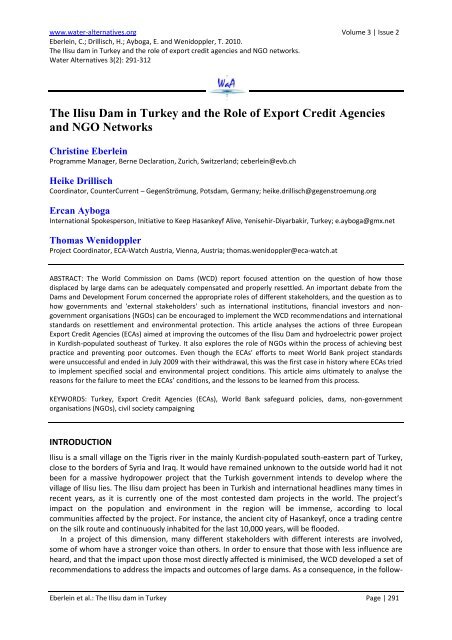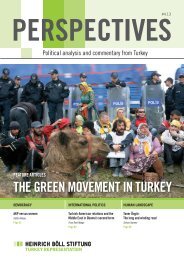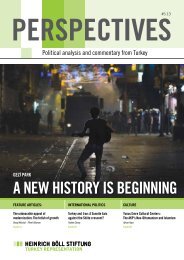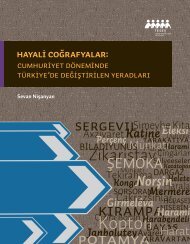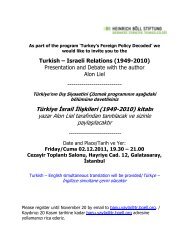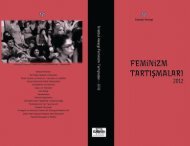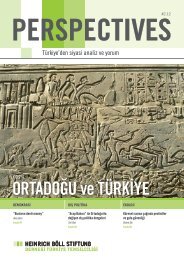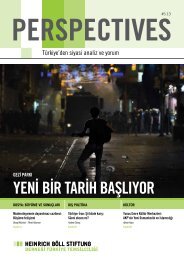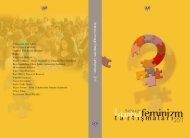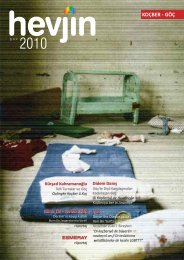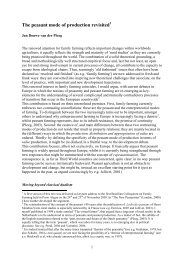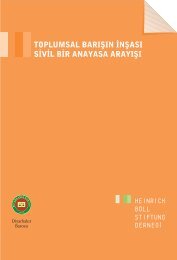The Ilisu Dam in Turkey and the Role of Export Credit Agencies and ...
The Ilisu Dam in Turkey and the Role of Export Credit Agencies and ...
The Ilisu Dam in Turkey and the Role of Export Credit Agencies and ...
You also want an ePaper? Increase the reach of your titles
YUMPU automatically turns print PDFs into web optimized ePapers that Google loves.
www.water-alternatives.org Volume 3 | Issue 2<br />
Eberle<strong>in</strong>, C.; Drillisch, H.; Ayboga, E. <strong>and</strong> Wenidoppler, T. 2010.<br />
<strong>The</strong> <strong>Ilisu</strong> dam <strong>in</strong> <strong>Turkey</strong> <strong>and</strong> <strong>the</strong> role <strong>of</strong> export credit agencies <strong>and</strong> NGO networks.<br />
Water Alternatives 3(2): 291-312<br />
<strong>The</strong> <strong>Ilisu</strong> <strong>Dam</strong> <strong>in</strong> <strong>Turkey</strong> <strong>and</strong> <strong>the</strong> <strong>Role</strong> <strong>of</strong> <strong>Export</strong> <strong>Credit</strong> <strong>Agencies</strong><br />
<strong>and</strong> NGO Networks<br />
Christ<strong>in</strong>e Eberle<strong>in</strong><br />
Programme Manager, Berne Declaration, Zurich, Switzerl<strong>and</strong>; ceberle<strong>in</strong>@evb.ch<br />
Heike Drillisch<br />
Coord<strong>in</strong>ator, CounterCurrent – GegenStrömung, Potsdam, Germany; heike.drillisch@gegenstroemung.org<br />
Ercan Ayboga<br />
International Spokesperson, Initiative to Keep Hasankeyf Alive, Yenisehir-Diyarbakir, <strong>Turkey</strong>; e.ayboga@gmx.net<br />
Thomas Wenidoppler<br />
Project Coord<strong>in</strong>ator, ECA-Watch Austria, Vienna, Austria; thomas.wenidoppler@eca-watch.at<br />
ABSTRACT: <strong>The</strong> World Commission on <strong>Dam</strong>s (WCD) report focused attention on <strong>the</strong> question <strong>of</strong> how those<br />
displaced by large dams can be adequately compensated <strong>and</strong> properly resettled. An important debate from <strong>the</strong><br />
<strong>Dam</strong>s <strong>and</strong> Development Forum concerned <strong>the</strong> appropriate roles <strong>of</strong> different stakeholders, <strong>and</strong> <strong>the</strong> question as to<br />
how governments <strong>and</strong> 'external stakeholders' such as <strong>in</strong>ternational <strong>in</strong>stitutions, f<strong>in</strong>ancial <strong>in</strong>vestors <strong>and</strong> nongovernment<br />
organisations (NGOs) can be encouraged to implement <strong>the</strong> WCD recommendations <strong>and</strong> <strong>in</strong>ternational<br />
st<strong>and</strong>ards on resettlement <strong>and</strong> environmental protection. This article analyses <strong>the</strong> actions <strong>of</strong> three European<br />
<strong>Export</strong> <strong>Credit</strong> <strong>Agencies</strong> (ECAs) aimed at improv<strong>in</strong>g <strong>the</strong> outcomes <strong>of</strong> <strong>the</strong> <strong>Ilisu</strong> <strong>Dam</strong> <strong>and</strong> hydroelectric power project<br />
<strong>in</strong> Kurdish-populated sou<strong>the</strong>ast <strong>of</strong> <strong>Turkey</strong>. It also explores <strong>the</strong> role <strong>of</strong> NGOs with<strong>in</strong> <strong>the</strong> process <strong>of</strong> achiev<strong>in</strong>g best<br />
practice <strong>and</strong> prevent<strong>in</strong>g poor outcomes. Even though <strong>the</strong> ECAs’ efforts to meet World Bank project st<strong>and</strong>ards<br />
were unsuccessful <strong>and</strong> ended <strong>in</strong> July 2009 with <strong>the</strong>ir withdrawal, this was <strong>the</strong> first case <strong>in</strong> history where ECAs tried<br />
to implement specified social <strong>and</strong> environmental project conditions. This article aims ultimately to analyse <strong>the</strong><br />
reasons for <strong>the</strong> failure to meet <strong>the</strong> ECAs’ conditions, <strong>and</strong> <strong>the</strong> lessons to be learned from this process.<br />
KEYWORDS: <strong>Turkey</strong>, <strong>Export</strong> <strong>Credit</strong> <strong>Agencies</strong> (ECAs), World Bank safeguard policies, dams, non-government<br />
organisations (NGOs), civil society campaign<strong>in</strong>g<br />
INTRODUCTION<br />
<strong>Ilisu</strong> is a small village on <strong>the</strong> Tigris river <strong>in</strong> <strong>the</strong> ma<strong>in</strong>ly Kurdish-populated south-eastern part <strong>of</strong> <strong>Turkey</strong>,<br />
close to <strong>the</strong> borders <strong>of</strong> Syria <strong>and</strong> Iraq. It would have rema<strong>in</strong>ed unknown to <strong>the</strong> outside world had it not<br />
been for a massive hydropower project that <strong>the</strong> Turkish government <strong>in</strong>tends to develop where <strong>the</strong><br />
village <strong>of</strong> <strong>Ilisu</strong> lies. <strong>The</strong> <strong>Ilisu</strong> dam project has been <strong>in</strong> Turkish <strong>and</strong> <strong>in</strong>ternational headl<strong>in</strong>es many times <strong>in</strong><br />
recent years, as it is currently one <strong>of</strong> <strong>the</strong> most contested dam projects <strong>in</strong> <strong>the</strong> world. <strong>The</strong> project’s<br />
impact on <strong>the</strong> population <strong>and</strong> environment <strong>in</strong> <strong>the</strong> region will be immense, accord<strong>in</strong>g to local<br />
communities affected by <strong>the</strong> project. For <strong>in</strong>stance, <strong>the</strong> ancient city <strong>of</strong> Hasankeyf, once a trad<strong>in</strong>g centre<br />
on <strong>the</strong> silk route <strong>and</strong> cont<strong>in</strong>uously <strong>in</strong>habited for <strong>the</strong> last 10,000 years, will be flooded.<br />
In a project <strong>of</strong> this dimension, many different stakeholders with different <strong>in</strong>terests are <strong>in</strong>volved,<br />
some <strong>of</strong> whom have a stronger voice than o<strong>the</strong>rs. In order to ensure that those with less <strong>in</strong>fluence are<br />
heard, <strong>and</strong> that <strong>the</strong> impact upon those most directly affected is m<strong>in</strong>imised, <strong>the</strong> WCD developed a set <strong>of</strong><br />
recommendations to address <strong>the</strong> impacts <strong>and</strong> outcomes <strong>of</strong> large dams. As a consequence, <strong>in</strong> <strong>the</strong> follow-<br />
Eberle<strong>in</strong> et al.: <strong>The</strong> <strong>Ilisu</strong> dam <strong>in</strong> <strong>Turkey</strong> Page | 291
Water Alternatives - 2010 Volume 3 | Issue 2<br />
up after <strong>the</strong> WCD, it was debated with<strong>in</strong> <strong>the</strong> <strong>Dam</strong>s <strong>and</strong> Development Forum 1 which roles were<br />
appropriate for <strong>the</strong> different stakeholders, <strong>and</strong> specifically governments <strong>and</strong> 'external stakeholders',<br />
such as <strong>in</strong>ternational <strong>in</strong>stitutions, f<strong>in</strong>ancial <strong>in</strong>vestors <strong>and</strong> NGOs. A question central to <strong>the</strong> discussion was<br />
how <strong>the</strong>se actors could be encouraged to implement <strong>the</strong> WCD recommendations <strong>and</strong> o<strong>the</strong>r<br />
<strong>in</strong>ternational st<strong>and</strong>ards on resettlement <strong>and</strong> environmental protection, such as World Bank st<strong>and</strong>ards,<br />
to improve compliance <strong>and</strong> accountability aligned with best practices.<br />
<strong>The</strong> construction <strong>of</strong> a large hydropower project is not only a technical endeavour, but also entails a<br />
complicated governance process <strong>and</strong> a complex f<strong>in</strong>ancial structure (Fliesser, 2010). When, <strong>in</strong> 2005<br />
(after an attempt failed some years earlier due to <strong>in</strong>ternational pressure from NGOs), <strong>Turkey</strong> <strong>in</strong>vited<br />
European companies to jo<strong>in</strong> <strong>the</strong> build<strong>in</strong>g consortium, <strong>the</strong> project was no longer a national affair but<br />
became a transnational <strong>and</strong> <strong>in</strong>ternational political <strong>and</strong> f<strong>in</strong>ancial decision (Warner, 2008). <strong>The</strong> European<br />
companies applied for export <strong>in</strong>surance cover with <strong>the</strong>ir national <strong>Export</strong> <strong>Credit</strong> <strong>Agencies</strong> (ECAs) <strong>and</strong> for<br />
export loans with European banks. 2 Hav<strong>in</strong>g learned from earlier attempts to establish <strong>in</strong>ternational<br />
build<strong>in</strong>g <strong>and</strong> f<strong>in</strong>ance consortia for <strong>the</strong> same project (1997-2002), <strong>the</strong> ECAs decided to request a set <strong>of</strong><br />
project conditions. <strong>The</strong> ECAs would only agree to support deliveries 3 to <strong>the</strong> project if <strong>Turkey</strong> committed<br />
to <strong>in</strong>ternational st<strong>and</strong>ards <strong>of</strong> dam build<strong>in</strong>g <strong>and</strong> met <strong>the</strong>ir safeguards (based on World Bank st<strong>and</strong>ards)<br />
to protect <strong>the</strong> environment, affected people, riparian states <strong>and</strong> cultural heritage.<br />
For <strong>the</strong> second time, European ECAs tried to implement specific social <strong>and</strong> environmental project<br />
conditions, this time <strong>in</strong>clud<strong>in</strong>g an agreement with <strong>Turkey</strong> <strong>and</strong> a tight monitor<strong>in</strong>g process. Although it<br />
became evident, after a three-year engagement, that <strong>the</strong>se conditions would not be met by <strong>Turkey</strong>, this<br />
was still a major step forward <strong>in</strong> attempt<strong>in</strong>g to apply <strong>in</strong>ternational st<strong>and</strong>ards to such projects. Hence,<br />
<strong>the</strong>re are significant lessons to be learned from this process.<br />
In this article we will analyse <strong>the</strong> actions <strong>of</strong> <strong>the</strong> German, Swiss <strong>and</strong> Austrian ECAs, who sought to<br />
adhere to World Bank st<strong>and</strong>ards for <strong>the</strong> <strong>Ilisu</strong> dam project. We will also exam<strong>in</strong>e <strong>the</strong> role <strong>of</strong><br />
transnational NGO networks with<strong>in</strong> this process, <strong>in</strong> which <strong>the</strong> authors were directly <strong>in</strong>volved, to<br />
promote best practices <strong>and</strong> to prevent <strong>the</strong> anticipated detrimental outcomes <strong>of</strong> <strong>the</strong> dam project.<br />
We beg<strong>in</strong> by giv<strong>in</strong>g a general overview <strong>of</strong> <strong>the</strong> <strong>Ilisu</strong> dam project <strong>in</strong>clud<strong>in</strong>g general issues on dam<br />
build<strong>in</strong>g <strong>in</strong> <strong>Turkey</strong> <strong>and</strong> <strong>the</strong> geographical, socioeconomic <strong>and</strong> political sett<strong>in</strong>gs <strong>of</strong> <strong>the</strong> South-eastern<br />
Anatolian Project (GAP), <strong>of</strong> which <strong>Ilisu</strong> is a part. In this context, we also exam<strong>in</strong>e <strong>the</strong> projected impact <strong>of</strong><br />
<strong>the</strong> <strong>Ilisu</strong> dam, <strong>Turkey</strong>’s plans for mitigat<strong>in</strong>g <strong>the</strong> consequences <strong>of</strong> construction <strong>and</strong> an overview <strong>of</strong> <strong>the</strong><br />
project history up to <strong>the</strong> withdrawal <strong>of</strong> <strong>the</strong> ECAs. We will <strong>the</strong>n analyse <strong>the</strong> roles <strong>and</strong> <strong>in</strong>terests <strong>of</strong> both<br />
primary <strong>and</strong> secondary stakeholders, particularly those <strong>of</strong> ECAs <strong>and</strong> NGOs as secondary stakeholders <strong>in</strong><br />
<strong>the</strong> <strong>Ilisu</strong> dam project. In <strong>the</strong> next two sections, we exam<strong>in</strong>e <strong>the</strong> measures taken by <strong>the</strong> ECAs to achieve<br />
World Bank st<strong>and</strong>ards <strong>and</strong> by NGOs to ensure that best practice was applied, or – if st<strong>and</strong>ards <strong>and</strong> best<br />
practices to prevent <strong>the</strong> occurrence <strong>of</strong> major negative impacts could not be met – that f<strong>in</strong>ancial support<br />
for <strong>the</strong> project would be rejected. In <strong>the</strong> f<strong>in</strong>al section we highlight how <strong>the</strong> ECAs failed <strong>in</strong> <strong>the</strong>ir efforts to<br />
implement World Bank st<strong>and</strong>ards <strong>and</strong> to encourage <strong>Turkey</strong> to abide by <strong>the</strong>ir obligations. We <strong>the</strong>n<br />
conclude with <strong>the</strong> lessons to be learned by all sides from this resource-<strong>in</strong>tensive process that stretched<br />
over a period <strong>of</strong> several years.<br />
1 www.unep.org/dams/<br />
2 Governments provide <strong>of</strong>ficial export credits through export credit agencies (ECAs) <strong>in</strong> support <strong>of</strong> national exporters compet<strong>in</strong>g<br />
for overseas sales. ECAs provide credits to foreign buyers ei<strong>the</strong>r directly or via private f<strong>in</strong>ancial <strong>in</strong>stitutions benefit<strong>in</strong>g from<br />
<strong>the</strong>ir <strong>in</strong>surance or guarantee cover. ECAs can be government <strong>in</strong>stitutions or private companies operat<strong>in</strong>g on behalf <strong>of</strong> <strong>the</strong><br />
government. www.oecd.org/about/0,3347,en_2649_34169_1_1_1_1_37431,00.html<br />
3 <strong>The</strong> Swiss ECA(SERV) uses <strong>the</strong> term<strong>in</strong>ology 'deliveries' as synonym for exports. See: www.serv-ch.com/fileadm<strong>in</strong>/servdateien/Download/Kompakt_E.pdf<br />
- <strong>The</strong> exports for deliveries <strong>in</strong>clude turb<strong>in</strong>es, generators <strong>and</strong> electric equipment etc.<br />
Eberle<strong>in</strong> et al.: <strong>The</strong> <strong>Ilisu</strong> dam <strong>in</strong> <strong>Turkey</strong> Page | 292
Water Alternatives - 2010 Volume 3 | Issue 2<br />
BACKGROUND INFORMATION ON THE ILISU DAM PROJECT<br />
<strong>Ilisu</strong>, a ma<strong>in</strong>ly Kurdish village on <strong>the</strong> river Tigris <strong>in</strong> south-eastern Anatolia, has become <strong>the</strong> eponymous<br />
large hydropower project. <strong>The</strong> planned <strong>Ilisu</strong> dam consists <strong>of</strong> a wall 1.8 km wide <strong>and</strong> 135 m high, <strong>and</strong> will<br />
create <strong>the</strong> third largest reservoir <strong>in</strong> <strong>Turkey</strong> cover<strong>in</strong>g an area <strong>of</strong> 313 km² (IEG, 2005). <strong>The</strong> €1.2 billion dam<br />
is to be situated ca. 65 km from <strong>the</strong> border with Syria <strong>and</strong> Iraq. <strong>The</strong> <strong>Ilisu</strong> dam has a designed capacity <strong>of</strong><br />
1200 MW <strong>and</strong> an annual production <strong>of</strong> 3822 GWh, approximately 2 per cent <strong>of</strong> <strong>the</strong> national electricity<br />
requirements (IEG, 2005).<br />
Figure 1. GAP region with <strong>the</strong> exist<strong>in</strong>g <strong>and</strong> planned dams <strong>and</strong> hydroelectric power plant projects<br />
(GegenStroemung <strong>and</strong> Initiative to Keep Hasankeyf Alive, 2009).<br />
<strong>The</strong> <strong>Ilisu</strong> dam project is part <strong>of</strong> a large <strong>in</strong>frastructure <strong>and</strong> development project by <strong>the</strong> Turkish<br />
Government for <strong>the</strong> whole south-eastern Anatolia region, which orig<strong>in</strong>ally dates back to <strong>the</strong> 1950s. <strong>The</strong><br />
Greater South-eastern Anatolian Project (GAP) 4 <strong>in</strong>cludes <strong>the</strong> construction <strong>of</strong> a total <strong>of</strong> 22 dams,<br />
<strong>in</strong>clud<strong>in</strong>g 19 hydropower plants for almost 10 per cent <strong>of</strong> <strong>the</strong> country <strong>and</strong> three dams for <strong>the</strong> irrigation<br />
<strong>of</strong> 1.8 million hectares <strong>of</strong> farml<strong>and</strong>; 5 15 <strong>of</strong> <strong>the</strong> dams have already been built (GAP, 2006; GAP, 2007).<br />
Accord<strong>in</strong>g to <strong>the</strong> Turkish government, GAP also aims to promote economic development <strong>and</strong> create 3.8<br />
million jobs for this region, where <strong>the</strong> gross regional product accounts for 5.5 per cent <strong>of</strong> <strong>the</strong> nation’s<br />
gross domestic product (GDP). Kurds are <strong>the</strong> majority ethnic group <strong>in</strong> this region, which is characterised<br />
by high unemployment, low literacy rates <strong>and</strong> unequal l<strong>and</strong> ownership (Avci, 1995; Goc-Der, 2006). This<br />
also applies to <strong>the</strong> <strong>Ilisu</strong> region, where people work ma<strong>in</strong>ly <strong>in</strong> cotton plantations, tourism <strong>and</strong> small<br />
heterogeneous cottage <strong>in</strong>dustries, or live as subsistence farmers with small gardens along <strong>the</strong> river.<br />
<strong>The</strong>re is no major <strong>in</strong>dustrial economic enterprise <strong>in</strong> <strong>the</strong> area <strong>and</strong> average <strong>in</strong>come is low. 6 <strong>The</strong> largest<br />
4 www.gap.gov.tr<br />
5 See <strong>of</strong>ficial GAP website: www.gap.gov.tr/gap_eng.php?sayfa=English/Ggbilgi/gozel.html<br />
6 See above.<br />
Eberle<strong>in</strong> et al.: <strong>The</strong> <strong>Ilisu</strong> dam <strong>in</strong> <strong>Turkey</strong> Page | 293
Water Alternatives - 2010 Volume 3 | Issue 2<br />
ethnic group with<strong>in</strong> <strong>the</strong> project region is Kurdish with o<strong>the</strong>r diverse orig<strong>in</strong>s such as Arab, Aramean <strong>and</strong><br />
Armenian.<br />
GAP has certa<strong>in</strong>ly generated a number <strong>of</strong> benefits <strong>in</strong> agricultural <strong>and</strong> energy production; however,<br />
its outcomes are ra<strong>the</strong>r conflict<strong>in</strong>g 7 <strong>and</strong>, as Harris (2008) po<strong>in</strong>ts out, can be quite different for <strong>in</strong>dividual<br />
groups. Harris moves on <strong>in</strong> her GAP case studies 8 to suggest that certa<strong>in</strong> populations have experienced<br />
enhanced vulnerabilities <strong>and</strong> considerable losses <strong>in</strong> addition to any ga<strong>in</strong>s <strong>and</strong> benefits <strong>of</strong> ongo<strong>in</strong>g<br />
changes (particularly <strong>the</strong> l<strong>and</strong>less, poor, some women <strong>and</strong> those previously engaged <strong>in</strong> animal<br />
husb<strong>and</strong>ry). Bisch<strong>of</strong>f <strong>and</strong> Pérouse (2003) give a detailed description <strong>of</strong> national heritage lost to <strong>the</strong><br />
flood<strong>in</strong>g <strong>of</strong> many cultural <strong>and</strong> religious heritage sites <strong>and</strong> archaeological artefacts by GAP dams, which<br />
<strong>the</strong> GAP adm<strong>in</strong>istration openly acknowledges (see Harris, 2002). Fur<strong>the</strong>r, a case study <strong>of</strong> <strong>the</strong> Swiss<br />
Federal Institute <strong>of</strong> Technology on GAP (Sahan et al., 2001) found <strong>the</strong> past 25 years <strong>of</strong> GAP<br />
implementation have created many unresolved problems, both ecological (erosion, sedimentation,<br />
sal<strong>in</strong>isation, fall<strong>in</strong>g water quality) <strong>and</strong> social (population displacement, archaeological site destruction).<br />
<strong>The</strong> study reported that "<strong>the</strong>se problems were not <strong>in</strong>vestigated properly, <strong>the</strong>re was no transparent<br />
<strong>in</strong>formation policy, <strong>the</strong> f<strong>in</strong>ancial impacts were misjudged <strong>and</strong> many problems rema<strong>in</strong>ed unresolved"<br />
(Sahan et al., 2001). Similar impacts were recognised by <strong>the</strong> WCD: "While dams have delivered many<br />
benefits <strong>and</strong> made a significant contribution to human development, <strong>in</strong> too many cases <strong>the</strong> price paid<br />
to secure those benefits, especially <strong>in</strong> social <strong>and</strong> environmental terms, has been too high <strong>and</strong>, more<br />
importantly, could have been avoided". 9<br />
Socio-political sett<strong>in</strong>g<br />
<strong>The</strong> many policies <strong>and</strong> programmes <strong>of</strong> <strong>the</strong> GAP need to be understood <strong>and</strong> evaluated <strong>in</strong> relation to <strong>the</strong><br />
long history <strong>of</strong> aggressive state policies toward <strong>the</strong> region. 10 Dur<strong>in</strong>g <strong>the</strong> 1980s <strong>and</strong> 1990s, <strong>the</strong> region<br />
was <strong>the</strong> centre <strong>of</strong> a civil 'ethnic-based' conflict between Turkish security forces <strong>and</strong> <strong>the</strong> armed Kurdish<br />
Workers’ Party (PKK). In 1978, <strong>the</strong> PKK was formed to defend <strong>the</strong> rights <strong>of</strong> <strong>the</strong> Kurdish population <strong>in</strong><br />
<strong>Turkey</strong>. <strong>The</strong> situation veered out <strong>of</strong> control, <strong>and</strong> <strong>in</strong> 1987 a permanent state <strong>of</strong> emergency was declared<br />
<strong>in</strong> <strong>the</strong> Kurdish regions <strong>of</strong> <strong>Turkey</strong>, which lasted until February 2002. Two <strong>and</strong> a half million people were<br />
driven from <strong>the</strong>ir homes by <strong>the</strong> Turkish military or fled <strong>in</strong> fear dur<strong>in</strong>g <strong>the</strong> conflict (KHRP, 2005).<br />
Although <strong>the</strong> military conflict ended <strong>in</strong> 1999, s<strong>in</strong>ce 2005 battles between <strong>the</strong> Turkish security forces <strong>and</strong><br />
<strong>the</strong> PKK have reignited sporadically. Despite <strong>the</strong> announcement by <strong>the</strong> Turkish government, <strong>in</strong> <strong>the</strong><br />
summer <strong>of</strong> 2009, that <strong>the</strong>y would be seek<strong>in</strong>g a peaceful solution to <strong>the</strong> Kurdish question, a heavy<br />
military presence is still <strong>in</strong> situ along <strong>the</strong> Syrian, Iranian <strong>and</strong> Iraqi borders, <strong>in</strong>clud<strong>in</strong>g <strong>the</strong> <strong>Ilisu</strong> region.<br />
Human rights organisations have revealed that arbitrary imprisonments <strong>and</strong> torture are still frequent<br />
occurrences (IHD, 2009).<br />
<strong>The</strong> security tensions could also be seen <strong>and</strong> felt <strong>in</strong> <strong>Ilisu</strong>. In 2008, for <strong>in</strong>stance, pre-construction work<br />
for <strong>the</strong> <strong>Ilisu</strong> dam consisted <strong>of</strong> secur<strong>in</strong>g <strong>the</strong> future reservoir from PKK attacks by encircl<strong>in</strong>g <strong>the</strong> area with<br />
military defence units <strong>and</strong> streng<strong>the</strong>n<strong>in</strong>g <strong>the</strong> military presence throughout <strong>the</strong> reservoir area. Visitors –<br />
locals <strong>and</strong> foreigners – without <strong>of</strong>ficial permission were not allowed to visit <strong>the</strong> areas ei<strong>the</strong>r side <strong>of</strong> <strong>the</strong><br />
Tigris near <strong>Ilisu</strong> where <strong>the</strong> dam wall was to be built. This also affected <strong>of</strong>ficial visits to monitor <strong>the</strong><br />
project’s progress. For example, <strong>in</strong> <strong>the</strong> summer <strong>of</strong> 2008, members <strong>of</strong> an <strong>in</strong>ternational group <strong>of</strong><br />
environment <strong>and</strong> cultural heritage experts were not allowed to visit certa<strong>in</strong> areas (CoE, 2008d). In 2008<br />
<strong>and</strong> 2009, when members <strong>of</strong> a local Turkish NGO tried to visit relatives liv<strong>in</strong>g <strong>in</strong> <strong>Ilisu</strong>, <strong>the</strong>y were arrested<br />
<strong>and</strong> deta<strong>in</strong>ed for two days (KHRP, 2008).<br />
7 For example, greater agricultural productivity may compromise soil or water quality, or <strong>in</strong>creased <strong>in</strong>come <strong>and</strong> benefits for<br />
some families may be realised at <strong>the</strong> cost <strong>of</strong> an <strong>in</strong>creased work burden fall<strong>in</strong>g heavily on women <strong>and</strong> children (Harris, 2002).<br />
8 F<strong>in</strong>d<strong>in</strong>gs from case studies <strong>in</strong> <strong>the</strong> Harran pla<strong>in</strong> <strong>of</strong> sou<strong>the</strong>astern <strong>Turkey</strong> (Harris, 2002 <strong>and</strong> 2008).<br />
9 WCD reports <strong>the</strong>sis www.unep.org/dams/documents/Default.asp?DocumentID=662<br />
10 For a detailed analysis, see Harris, 2002.<br />
Eberle<strong>in</strong> et al.: <strong>The</strong> <strong>Ilisu</strong> dam <strong>in</strong> <strong>Turkey</strong> Page | 294
Water Alternatives - 2010 Volume 3 | Issue 2<br />
Figure 2. Area affected by <strong>the</strong> <strong>Ilisu</strong> Project (GegenStroemung <strong>and</strong> Initiative to Keep Hasankeyf Alive,<br />
2009).<br />
Ano<strong>the</strong>r remnant <strong>of</strong> <strong>the</strong> Kurdish conflict are government-appo<strong>in</strong>ted 'village guards', charged with<br />
'protect<strong>in</strong>g' Kurdish villages. <strong>The</strong>se guards tend to abuse <strong>the</strong>ir position; for example, when <strong>the</strong> authors<br />
<strong>of</strong> this article visited <strong>the</strong> region to ga<strong>the</strong>r <strong>in</strong>formation about <strong>the</strong> impacts <strong>of</strong> <strong>the</strong> <strong>Ilisu</strong> dam project <strong>in</strong><br />
October 2007, we were arrested by village guards <strong>and</strong> taken to <strong>the</strong> local military post (Eberle<strong>in</strong> <strong>and</strong><br />
Ayboga, 2007). Inquiries by <strong>the</strong> Kurdish Human Rights Project showed that due to <strong>the</strong> strong military<br />
presence <strong>and</strong> omnipresence <strong>of</strong> <strong>the</strong> village guards, people most affected by <strong>the</strong> <strong>Ilisu</strong> dam are reluctant<br />
to voice <strong>the</strong>ir op<strong>in</strong>ions about <strong>the</strong> dam (KHRP, 2005).<br />
<strong>Ilisu</strong> dam – History<br />
A brief overview <strong>of</strong> <strong>the</strong> history <strong>of</strong> <strong>the</strong> dam project 11 is important, <strong>in</strong> order to show why external<br />
f<strong>in</strong>anciers <strong>and</strong> companies, <strong>in</strong>volved <strong>in</strong> <strong>the</strong> third attempt to build <strong>Ilisu</strong> <strong>in</strong> 2005, paid particular attention<br />
to <strong>the</strong> monitor<strong>in</strong>g <strong>and</strong> implementation <strong>of</strong> <strong>in</strong>ternational st<strong>and</strong>ards. <strong>The</strong> first attempt to build <strong>the</strong> dam as<br />
a build-operate-transfer (BOT) project failed <strong>in</strong> 1996 due to a lack <strong>of</strong> <strong>in</strong>vestors (Hildyard et al., 2000). A<br />
second attempt was launched by <strong>the</strong> Turkish government <strong>in</strong> 1998 by commission<strong>in</strong>g an <strong>in</strong>ternational<br />
consortium led by <strong>the</strong> British construction company Balfour Beatty, <strong>in</strong>clud<strong>in</strong>g companies from<br />
Switzerl<strong>and</strong>, Italy, Great Brita<strong>in</strong>, Germany <strong>and</strong> <strong>Turkey</strong> <strong>and</strong> <strong>the</strong> Union Bank <strong>of</strong> Switzerl<strong>and</strong>, as f<strong>in</strong>ancial<br />
supervisor (Setton <strong>and</strong> Drillisch, 2006). To cover <strong>the</strong> f<strong>in</strong>ancial risk, <strong>the</strong> European companies received<br />
export risk guarantees from <strong>the</strong>ir respective ECAs. As <strong>the</strong> project did not meet best practice, though,<br />
11 For a detailed analysis <strong>of</strong> <strong>the</strong> second attempt to build <strong>Ilisu</strong>, see also Bisch<strong>of</strong>f <strong>and</strong> Pérouse (2008) <strong>and</strong> <strong>the</strong> article by Warner<br />
(2008), analys<strong>in</strong>g <strong>the</strong> 1998-2002 NGO campaign.<br />
Eberle<strong>in</strong> et al.: <strong>The</strong> <strong>Ilisu</strong> dam <strong>in</strong> <strong>Turkey</strong> Page | 295
Water Alternatives - 2010 Volume 3 | Issue 2<br />
<strong>the</strong> ECAs dem<strong>and</strong>ed that three conditions be fulfilled before construction <strong>of</strong> <strong>the</strong> dam 12 (Hildyard et al.,<br />
2000; Bisch<strong>of</strong>f <strong>and</strong> Pérouse, 2003). Yet, after three years <strong>of</strong> project assessment, civil society<br />
organisations <strong>in</strong> Europe 13 exposed that <strong>the</strong> previously identified environmental <strong>and</strong> social problems<br />
rema<strong>in</strong>ed unresolved (Balfour Beatty, 2001; UBS, 2002). On 13 November, 2001, Balfour Beatty <strong>and</strong> <strong>the</strong><br />
Italian company Impregilo withdrew from <strong>Ilisu</strong>, comment<strong>in</strong>g that "no fur<strong>the</strong>r action nor any fur<strong>the</strong>r<br />
expenditure by Balfour Beatty on this project is likely to resolve <strong>the</strong> outst<strong>and</strong><strong>in</strong>g issues <strong>in</strong> a reasonable<br />
timescale" (Balfour Beatty, 2001). In February, 2002, <strong>the</strong> f<strong>in</strong>ancial supervisor UBS Switzerl<strong>and</strong> also<br />
withdrew due to unresolved environmental <strong>and</strong> social issues, which ended <strong>the</strong> second attempt to build<br />
<strong>Ilisu</strong>. 14<br />
In 2005, <strong>the</strong> Turkish State Hydraulic Works (DSI) recommenced <strong>the</strong> project <strong>and</strong> commissioned a new<br />
consortium, this time led by <strong>the</strong> Austrian company VA Tech Hydro (part <strong>of</strong> Andritz Austria). O<strong>the</strong>r<br />
build<strong>in</strong>g companies <strong>in</strong>volved were: Alstom, Stucky, Colenco <strong>and</strong> Maggia from Switzerl<strong>and</strong>, Zübl<strong>in</strong> from<br />
Germany <strong>and</strong> Nurol, Cengiz, Celikler <strong>and</strong> Temelsu from <strong>Turkey</strong>. As <strong>Turkey</strong> lacked <strong>the</strong> f<strong>in</strong>ancial means to<br />
pay <strong>the</strong> upfront costs, <strong>the</strong> Austrian, German <strong>and</strong> Swiss companies, <strong>in</strong> order to m<strong>in</strong>imise <strong>the</strong>ir risk,<br />
applied for export risk coverage from <strong>the</strong>ir national <strong>Export</strong> <strong>Credit</strong> <strong>Agencies</strong> (ECAs) (€450 million). 15 In<br />
addition, European private banks DekaBank (GER), Bank Austria <strong>Credit</strong>anstalt (A), Unicredit (Italy) <strong>and</strong><br />
Société Générale (F), toge<strong>the</strong>r with <strong>the</strong> Turkish banks Akbank <strong>and</strong> Garantibank, signed <strong>the</strong> necessary<br />
f<strong>in</strong>anc<strong>in</strong>g contracts <strong>in</strong> August 2007 to underwrite <strong>the</strong> project (Die Presse, 2007).<br />
<strong>The</strong> Turkish government may have learned from <strong>the</strong> earlier experience that build<strong>in</strong>g <strong>the</strong> dam with<br />
<strong>the</strong> support <strong>of</strong> <strong>in</strong>ternational f<strong>in</strong>ance would mean that conditions would be imposed by external<br />
f<strong>in</strong>anciers <strong>and</strong> ECAs to meet World Bank st<strong>and</strong>ards.<br />
<strong>Ilisu</strong> dam – Projected impact<br />
Previous large dams built with<strong>in</strong> GAP have been shown to have negative consequences. 16 With <strong>the</strong> large<br />
reservoir size <strong>and</strong> its location with<strong>in</strong> a cultural heritage area rich <strong>in</strong> biodiversity, <strong>the</strong> local population<br />
toge<strong>the</strong>r with civil society organisations fear that <strong>Ilisu</strong> will repeat previous experiences (Initiative to<br />
Keep Hasankeyf Alive, 2006). A summary <strong>of</strong> <strong>the</strong> expressed concerns follows.<br />
Displacement<br />
<strong>The</strong> <strong>Ilisu</strong> reservoir would flood a total <strong>of</strong> 199 settlements. This <strong>in</strong>cludes <strong>the</strong> town <strong>of</strong> Hasankeyf, with<br />
3700 <strong>in</strong>habitants, <strong>and</strong> four smaller towns. Figures on how many people would be affected vary from<br />
12,000 (DSI, 2005) to 78,000 <strong>in</strong> a study by former World Bank specialist Kudat (2006). Gaps <strong>in</strong> <strong>the</strong><br />
Turkish laws on expropriation <strong>and</strong> resettlement, <strong>and</strong> project documents like <strong>the</strong> Resettlement Action<br />
Plan (RAP), give rise to concerns that <strong>the</strong> majority <strong>of</strong> <strong>the</strong> affected people would be impoverished.<br />
Cultural heritage<br />
<strong>The</strong> area <strong>of</strong> <strong>the</strong> planned <strong>Ilisu</strong> reservoir is home to hundreds <strong>of</strong> archaeological sites, most <strong>of</strong> which are<br />
unexplored (IEG, 2005). <strong>The</strong> dam would also flood <strong>the</strong> ancient town <strong>of</strong> Hasankeyf, a place <strong>of</strong> particular<br />
significance for <strong>the</strong> region <strong>and</strong> beyond, as it is one <strong>of</strong> <strong>the</strong> few places <strong>in</strong> <strong>the</strong> world that has been<br />
<strong>in</strong>habited without <strong>in</strong>terruption for between 9000 <strong>and</strong> 12,000 years (Ahunbay <strong>and</strong> Balkiz, 2009).<br />
Remnants <strong>of</strong> over twenty cultures can be found <strong>in</strong> <strong>the</strong> town (Schmid<strong>in</strong>ger, n.d.) <strong>and</strong> monuments from<br />
12 <strong>The</strong> conditions <strong>in</strong>cluded <strong>the</strong> build<strong>in</strong>g <strong>of</strong> water purification plants; a resettlement action plan <strong>in</strong> l<strong>in</strong>e with <strong>in</strong>ternational best<br />
practice; <strong>the</strong> assurance <strong>of</strong> adequate water flow for neighbour<strong>in</strong>g countries; <strong>and</strong> a detailed plan for <strong>the</strong> conservation <strong>of</strong><br />
Hasankeyf (Hildyard et al., 2000).<br />
13 <strong>The</strong> Berne Declaration, <strong>The</strong> Corner House, WEED, <strong>the</strong> Kurdish Human Rights Project, etc.<br />
14 Letter from UBS to Berne Declaration stat<strong>in</strong>g <strong>the</strong> withdrawal <strong>in</strong> 2002 <strong>and</strong> <strong>the</strong> confirmation not to engage <strong>in</strong> <strong>Ilisu</strong> aga<strong>in</strong>, 18<br />
July 2007.<br />
15 www.agaportal.de/en/aga/nachhaltigkeit/umwelt/projekt/ilisu/beteiligte.html<br />
16 www.hasankeyfgirisimi.com/en/<strong>in</strong>dex-dateien/comment_ilisu_diyarbakirgocder_rap_engl.pdf<br />
Eberle<strong>in</strong> et al.: <strong>The</strong> <strong>Ilisu</strong> dam <strong>in</strong> <strong>Turkey</strong> Page | 296
Water Alternatives - 2010 Volume 3 | Issue 2<br />
<strong>the</strong> 12th <strong>and</strong> 13th centuries <strong>of</strong>fer wide-rang<strong>in</strong>g research opportunities for scientists (Bisch<strong>of</strong>f <strong>and</strong><br />
Pérouse, 2003). 17 Ankara claims it is tak<strong>in</strong>g all measures to survey <strong>and</strong> excavate historic sites <strong>and</strong> that<br />
this GAP project is needed to save <strong>the</strong> region from poverty by provid<strong>in</strong>g sources <strong>of</strong> power <strong>and</strong><br />
irrigation. 18 Accord<strong>in</strong>g to Turkish cultural heritage protection laws, Hasankeyf is a category 1 Turkish<br />
Cultural Heritage Site <strong>and</strong> must be protected. However, a 'pr<strong>in</strong>cipal decision' taken by <strong>the</strong> Turkish<br />
M<strong>in</strong>istry for Culture <strong>and</strong> Tourism from October 4, 2006, (Res. No. 717) lifted <strong>the</strong> protection <strong>of</strong> cultural<br />
heritage, as <strong>the</strong> dam project was considered <strong>in</strong>dispensable. A decision by <strong>the</strong> adm<strong>in</strong>istrative court <strong>of</strong><br />
Diyarbakir from February 2010 (Radikal, 2010), however, ruled that <strong>the</strong>re was no legal basis for <strong>the</strong><br />
flood<strong>in</strong>g <strong>and</strong> relocation <strong>of</strong> <strong>in</strong>dividual monuments <strong>of</strong> Hasankeyf.<br />
Environmental impact<br />
<strong>The</strong> projected reservoir lies <strong>in</strong> a region rich <strong>in</strong> biodiversity (Eken, 2009). <strong>The</strong> habitat <strong>of</strong> rare <strong>and</strong><br />
endangered species can be found along <strong>the</strong> Tigris river (Stop <strong>Ilisu</strong> Campaign, 2009). <strong>The</strong> <strong>Ilisu</strong> dam would<br />
impact upon approximately 400 km <strong>of</strong> <strong>the</strong> river<strong>in</strong>e ecosystems along <strong>the</strong> Tigris <strong>and</strong> its tributaries,<br />
namely Botan, Batman <strong>and</strong> Salat (Biricik, 2006). <strong>The</strong> impact would be felt far downstream due to<br />
irregular discharges dur<strong>in</strong>g <strong>the</strong> day <strong>and</strong> throughout <strong>the</strong> year (IEG, 2005), <strong>and</strong> hydrologists have warned<br />
<strong>of</strong> a drastic deterioration <strong>in</strong> water quality (EAWAG, 2006).<br />
Transboundary impact<br />
<strong>The</strong> Tigris flows through <strong>the</strong> sou<strong>the</strong>ast <strong>of</strong> <strong>Turkey</strong>, form<strong>in</strong>g a border with Syria for some twenty<br />
kilometres, <strong>and</strong> <strong>the</strong>n runn<strong>in</strong>g on <strong>in</strong>to Iraq. <strong>The</strong> planned location for <strong>the</strong> <strong>Ilisu</strong> dam is approximately sixty<br />
kilometres upstream from <strong>the</strong> Iraqi border. Warner has already discussed some <strong>of</strong> <strong>the</strong> transboundary<br />
impacts <strong>of</strong> <strong>the</strong> GAP project, <strong>in</strong>clud<strong>in</strong>g <strong>the</strong> impacts <strong>of</strong> <strong>Ilisu</strong> on <strong>the</strong> Tigris (Warner, 2008). A study by US<br />
environmental consultant Phil Williams (2006) po<strong>in</strong>ts out that <strong>the</strong> creation <strong>of</strong> a huge reservoir will<br />
capture <strong>the</strong> water <strong>of</strong> <strong>the</strong> spr<strong>in</strong>g floods <strong>and</strong>, <strong>in</strong> comb<strong>in</strong>ation with diversions from <strong>the</strong> future downstream<br />
Cizre project (a dam with <strong>the</strong> ma<strong>in</strong> objective <strong>of</strong> irrigation), would significantly impact on <strong>the</strong> agricultural<br />
production <strong>of</strong> <strong>the</strong> downstream population (PWA, 2006). Hasan Janabi, former water consultant to <strong>the</strong><br />
Iraqi government, warns that <strong>the</strong> impact will be felt as far downstream as <strong>the</strong> Mesopotamian marshes,<br />
which were adversely affected dur<strong>in</strong>g Saddam Husse<strong>in</strong>’s reign <strong>and</strong> have only recently recovered due to<br />
<strong>the</strong> efforts <strong>of</strong> conservationists (Janabi, 2009). 19 Critics warn that <strong>the</strong> <strong>Ilisu</strong> dam project could cause<br />
political <strong>in</strong>stability <strong>in</strong> <strong>the</strong> region, as it would enable <strong>Turkey</strong> to exert pressure on its neighbours by<br />
restrict<strong>in</strong>g water flows (Dietziker, 1998) <strong>and</strong> would signify a manifestation <strong>of</strong> Turkish imperialism at<br />
home <strong>and</strong> abroad (Monbiot, 1999). However, <strong>Turkey</strong> claims that <strong>the</strong> opposite is true, that <strong>the</strong> dam will<br />
contribute to regional development <strong>and</strong> stability (DSI, 2009).<br />
Turkish plans to mitigate consequences<br />
In <strong>the</strong> <strong>Ilisu</strong> Environmental Impact <strong>and</strong> Resettlement Action Plans 20 from 2005 <strong>and</strong> 2006, <strong>Turkey</strong> detailed<br />
its mitigation plans for <strong>the</strong> expected negative consequences. Special safeguard measures, which had<br />
not been applied to o<strong>the</strong>r dams <strong>in</strong> <strong>the</strong> GAP region, <strong>in</strong>cluded a comparatively large resettlement budget<br />
(€800 million), compensation for <strong>the</strong> affected population, <strong>in</strong>come restoration measures, grievance<br />
procedures <strong>and</strong> <strong>the</strong> promise to transfer twelve historic monuments – <strong>in</strong>clud<strong>in</strong>g <strong>the</strong> Tigris bridge dat<strong>in</strong>g<br />
17 <strong>The</strong> Architect Pr<strong>of</strong>essor Zeynep Ahunbay states that Hasankeyf, as well as be<strong>in</strong>g an important cultural site <strong>in</strong> <strong>the</strong> region,<br />
must be considered as hav<strong>in</strong>g cultural heritage relevance for all <strong>of</strong> mank<strong>in</strong>d (Ahunbay <strong>and</strong> Balkiz, 2009).<br />
18 www.gap.gov.tr/gap_eng.php?sayfa=English/Ggbilgi/gozel.html<br />
19 In <strong>the</strong> 1990s, Saddam Husse<strong>in</strong> <strong>in</strong>itiated his Third River project, connect<strong>in</strong>g <strong>the</strong> Euphrates <strong>and</strong> Tigris <strong>in</strong> part to 'dehydrate' <strong>the</strong><br />
marshes to ga<strong>in</strong> access to <strong>the</strong> elusive Ma’adan (an ethnic community referred to as 'marsh Arabs') <strong>in</strong> Central Iraq, who had so<br />
far eluded his control (Warner, 2008).<br />
20 <strong>The</strong> <strong>Ilisu</strong> dam <strong>and</strong> HEPP Project’s Environmental Impact Assessment <strong>and</strong> Resettlement Action Plans are onl<strong>in</strong>e on DSI’s<br />
homepage: www.dsi.gov.tr/ilisu/ilisu_ced_eng.pdf<br />
Eberle<strong>in</strong> et al.: <strong>The</strong> <strong>Ilisu</strong> dam <strong>in</strong> <strong>Turkey</strong> Page | 297
Water Alternatives - 2010 Volume 3 | Issue 2<br />
from <strong>the</strong> 15th century <strong>and</strong> a mosque from <strong>the</strong> 14th century – to an archaeological park on <strong>the</strong><br />
reservoir’s banks (IEG, 2005; DSI <strong>and</strong> Encon, 2005).<br />
Between 2002 <strong>and</strong> 2006, representatives <strong>of</strong> <strong>the</strong> DSI were <strong>in</strong>vited by <strong>the</strong> United Nations<br />
Environmental Program (UNEP) as observers to <strong>the</strong> <strong>Dam</strong>s <strong>and</strong> Development Project’s Forum (DDP), <strong>the</strong><br />
follow up forum to <strong>the</strong> WCD. Fur<strong>the</strong>r, <strong>the</strong> WCD report’s overview was translated <strong>in</strong>to Turkish <strong>and</strong><br />
distributed with<strong>in</strong> <strong>the</strong> government. While <strong>the</strong> Turkish government did not support <strong>the</strong> application <strong>of</strong><br />
<strong>the</strong> WCD recommendations, DSI representatives were likely aware <strong>of</strong> its recommendations, but did not<br />
<strong>in</strong>tegrate <strong>the</strong> recommendations <strong>in</strong>to national laws.<br />
EXTERNAL STAKEHOLDERS: ECAS AND NGOS – ROLES, INTERESTS AND STANDARDS<br />
In any large project such as <strong>the</strong> <strong>Ilisu</strong> dam, many stakeholders are <strong>in</strong>volved (government bodies,<br />
contractors, <strong>in</strong>vestors, affected communities, etc.) <strong>and</strong> follow different <strong>in</strong>terests <strong>and</strong> strategies. In this<br />
analysis we primarily exam<strong>in</strong>e <strong>the</strong> <strong>in</strong>terests <strong>and</strong> roles <strong>of</strong> ECAs <strong>and</strong> NGOs <strong>in</strong> <strong>the</strong> <strong>Ilisu</strong> dam project. To<br />
expla<strong>in</strong> <strong>the</strong>ir self-determ<strong>in</strong>ed legitimacy <strong>in</strong> <strong>in</strong>fluenc<strong>in</strong>g <strong>the</strong> outcome <strong>of</strong> <strong>Ilisu</strong>, we first need to set <strong>the</strong>ir<br />
engagement <strong>in</strong> a <strong>the</strong>oretical context <strong>of</strong> transnational governance <strong>and</strong> actors. We will use <strong>the</strong><br />
term<strong>in</strong>ology <strong>of</strong> <strong>the</strong> International Bank for Reconstruction <strong>and</strong> Development, Involuntary Resettlement<br />
Sourcebook: "Primary stakeholders are those most directly affected (…). O<strong>the</strong>r people who have an<br />
<strong>in</strong>terest <strong>in</strong> <strong>the</strong> project – such as <strong>the</strong> project authority itself, <strong>the</strong> beneficiaries <strong>of</strong> <strong>the</strong> project (...) <strong>and</strong><br />
<strong>in</strong>terested NGOs are termed secondary stakeholders".<br />
In Br<strong>in</strong>g<strong>in</strong>g Transnational Relations Back In, Thomas Risse-Kappen (1997) def<strong>in</strong>es transnational<br />
relations as "regular <strong>in</strong>teractions across national boundaries when at least one actor is a non-state<br />
agent or does not operate on behalf <strong>of</strong> a national government or an <strong>in</strong>tergovernmental organisation".<br />
By commission<strong>in</strong>g an <strong>in</strong>ternational consortium <strong>of</strong> private corporations that required <strong>of</strong>ficial export<br />
coverage <strong>of</strong> <strong>the</strong>ir exports to build <strong>Ilisu</strong>, <strong>the</strong> Turkish government accepted <strong>Ilisu</strong> as a transnational project<br />
<strong>in</strong>clud<strong>in</strong>g transnational actors. In <strong>the</strong>ory, <strong>the</strong>y also had to accept that <strong>the</strong> st<strong>and</strong>ards set by ECAs, <strong>the</strong>ir<br />
governments <strong>and</strong> <strong>the</strong> legitimate <strong>in</strong>volvement <strong>of</strong> transnational NGOs would also apply to <strong>Ilisu</strong>.<br />
Who are <strong>the</strong> external stakeholders <strong>and</strong> how do <strong>the</strong>y legitimise <strong>the</strong>ir <strong>in</strong>volvement? As outl<strong>in</strong>ed, we<br />
will focus on secondary stakeholders <strong>in</strong> ensur<strong>in</strong>g that <strong>the</strong> project met <strong>in</strong>ternational st<strong>and</strong>ards. However,<br />
to underst<strong>and</strong> <strong>the</strong> role <strong>of</strong> <strong>the</strong> transnational NGO network, it is important to mention briefly <strong>the</strong> roles<br />
<strong>and</strong> <strong>in</strong>terests <strong>of</strong> <strong>the</strong> primary stakeholders.<br />
Primary stakeholders <strong>in</strong> <strong>Ilisu</strong><br />
<strong>The</strong> primary stakeholders <strong>in</strong> <strong>Ilisu</strong> <strong>in</strong>clude <strong>the</strong> potentially affected people, regional civil society<br />
organisations lobby<strong>in</strong>g aga<strong>in</strong>st <strong>the</strong> project <strong>and</strong> national environmental organisations.<br />
At <strong>the</strong> beg<strong>in</strong>n<strong>in</strong>g <strong>of</strong> 2005, <strong>the</strong> general public learned that <strong>Turkey</strong> was to launch yet ano<strong>the</strong>r attempt<br />
to build <strong>the</strong> <strong>Ilisu</strong> dam. Different civil society organisations <strong>in</strong> <strong>the</strong> affected region decided to jo<strong>in</strong> forces<br />
to fight aga<strong>in</strong>st <strong>the</strong> build<strong>in</strong>g <strong>of</strong> <strong>the</strong> project. In January, 2006, 20 human rights <strong>and</strong> environmental<br />
organisations from <strong>the</strong> regions <strong>of</strong> Diyarbakir, Batman, Hasankeyf <strong>and</strong> <strong>Ilisu</strong> founded <strong>the</strong> Initiative to Keep<br />
Hasankeyf Alive (Hasankeyf’i Yaşatma Girişimi). 21 One year later, <strong>the</strong> <strong>in</strong>itiative united seventy-three<br />
different organisations <strong>in</strong>clud<strong>in</strong>g <strong>the</strong> municipalities affected, local NGOs, unions <strong>and</strong> pr<strong>of</strong>essional<br />
organisations, among o<strong>the</strong>rs – someth<strong>in</strong>g that had never happened before <strong>in</strong> <strong>Turkey</strong>.<br />
<strong>The</strong> Initiative to Keep Hasankeyf Alive started <strong>in</strong> 2006 by network<strong>in</strong>g with affected people, retriev<strong>in</strong>g<br />
<strong>in</strong>formation from <strong>the</strong> area <strong>and</strong> dissem<strong>in</strong>at<strong>in</strong>g it <strong>in</strong> <strong>Turkey</strong> <strong>and</strong> Europe. <strong>The</strong> <strong>in</strong>itiative set up chapters <strong>in</strong><br />
different areas <strong>of</strong> <strong>the</strong> affected region <strong>and</strong> soon became <strong>the</strong> biggest platform for civil society<br />
organisations <strong>in</strong> Sou<strong>the</strong>ast Anatolia to fight for <strong>the</strong> preservation <strong>of</strong> <strong>the</strong> region’s cultural heritage, <strong>the</strong><br />
Tigris river ecosystem <strong>and</strong> for socioeconomic development <strong>in</strong> <strong>the</strong> <strong>in</strong>terests <strong>of</strong> <strong>the</strong> local population. In<br />
21 www.hasankeyfgirisimi.com<br />
Eberle<strong>in</strong> et al.: <strong>The</strong> <strong>Ilisu</strong> dam <strong>in</strong> <strong>Turkey</strong> Page | 298
Water Alternatives - 2010 Volume 3 | Issue 2<br />
2007, one <strong>of</strong> <strong>Turkey</strong>’s largest environmental organisations, Doga Dernegi, began campaign<strong>in</strong>g aga<strong>in</strong>st<br />
<strong>the</strong> <strong>Ilisu</strong> <strong>Dam</strong>. 22 It aimed to show ma<strong>in</strong>stream society <strong>the</strong> disastrous ecological <strong>and</strong> cultural<br />
consequences <strong>of</strong> <strong>the</strong> project <strong>and</strong> that a site <strong>of</strong> national heritage would soon be <strong>in</strong>undated.<br />
Inquiries by <strong>the</strong> <strong>in</strong>itiative revealed that <strong>the</strong> majority <strong>of</strong> <strong>the</strong> directly affected population were<br />
subsistence farmers or cotton workers <strong>in</strong> feudal-like systems <strong>and</strong> liv<strong>in</strong>g <strong>in</strong> remote areas, who had never<br />
been exposed to <strong>the</strong> concept <strong>of</strong> jo<strong>in</strong><strong>in</strong>g a civil society network <strong>and</strong> may fear that opposition to a state<br />
project posed a serious personal risk (KHRP, 2005).<br />
<strong>The</strong> <strong>in</strong>itiative was concerned that it was unsafe <strong>and</strong> <strong>the</strong>refore ill-advised to raise objections to<br />
government projects, especially those <strong>in</strong>volv<strong>in</strong>g dams – <strong>the</strong> Turkish government saw dams as a means<br />
<strong>of</strong> br<strong>in</strong>g<strong>in</strong>g prosperity to <strong>the</strong> nation <strong>and</strong> would not tolerate opposition. Two examples illustrate this<br />
position: <strong>in</strong> 2009, <strong>the</strong> Turkish M<strong>in</strong>ister <strong>of</strong> Energy called opponents <strong>of</strong> <strong>the</strong> <strong>Ilisu</strong> project terrorists 23 <strong>and</strong>, <strong>in</strong><br />
March 2009, two members <strong>of</strong> a US NGO were arrested at <strong>the</strong> Water Forum <strong>in</strong> Istanbul for hang<strong>in</strong>g up a<br />
banner say<strong>in</strong>g "No risky dams". Aware <strong>of</strong> <strong>the</strong>ir limited <strong>in</strong>fluence on <strong>the</strong> Turkish government’s position,<br />
<strong>the</strong> Turkish campaigns teamed up with groups <strong>in</strong> Europe, hop<strong>in</strong>g that European NGOs <strong>and</strong> <strong>the</strong> Kurdish<br />
diaspora <strong>in</strong> Germany, Switzerl<strong>and</strong> <strong>and</strong> Austria could stop external fund<strong>in</strong>g <strong>and</strong> <strong>the</strong>reby br<strong>in</strong>g to a<br />
st<strong>and</strong>still <strong>the</strong> entire project.<br />
International NGO campaigns as secondary stakeholders<br />
Networks form <strong>the</strong>mselves around a set <strong>of</strong> issues perceived as problematic, such as <strong>the</strong> environment<br />
<strong>and</strong> human rights (Fliesser, 2010). "A transnational advocacy network <strong>in</strong>cludes those relevant actors<br />
work<strong>in</strong>g <strong>in</strong>ternationally on an issue who are bound toge<strong>the</strong>r by shared values, a common discourse, <strong>and</strong><br />
exchange <strong>of</strong> <strong>in</strong>formation <strong>and</strong> services" (Keck <strong>and</strong> Sikk<strong>in</strong>k, 1998). Sociologist Andreas Atzl has<br />
demonstrated <strong>in</strong> his <strong>the</strong>sis (Atzl, 2009) "that <strong>the</strong> <strong>Ilisu</strong> campaign is a typical example <strong>of</strong> a campaign<br />
organized by a transnational advocacy network". As mentioned <strong>in</strong> <strong>the</strong> <strong>Ilisu</strong> history section, <strong>the</strong><br />
European <strong>Ilisu</strong> campaign 24 was created <strong>in</strong> 1998 <strong>and</strong> revived <strong>in</strong> 2005. 25 <strong>The</strong> general objectives <strong>of</strong> <strong>the</strong><br />
<strong>in</strong>volved NGOs is to ensure that <strong>the</strong>ir respective national ECAs implement <strong>the</strong> highest environmental<br />
<strong>and</strong> social st<strong>and</strong>ards <strong>in</strong> order to protect <strong>the</strong> <strong>in</strong>terests <strong>and</strong> lives <strong>of</strong> those affected by large <strong>in</strong>frastructure<br />
projects, as well as to protect <strong>the</strong> environment <strong>and</strong> cultural heritage. As ECAs are national or sem<strong>in</strong>ational<br />
<strong>in</strong>stitutions, <strong>the</strong> NGOs engage <strong>in</strong> advocacy work <strong>in</strong> <strong>the</strong>ir countries to ensure that public funds<br />
are used <strong>in</strong> ways that are consistent with <strong>the</strong>ir own national laws <strong>and</strong> also abide by <strong>in</strong>ternational<br />
st<strong>and</strong>ards <strong>and</strong> agreements. With regards to <strong>Ilisu</strong>, <strong>the</strong> NGOs were also focused on ensur<strong>in</strong>g<br />
accountability <strong>and</strong> transparency, tak<strong>in</strong>g <strong>the</strong>ir role as representatives for those who had no power to<br />
participate <strong>in</strong> shap<strong>in</strong>g political decisions. <strong>The</strong> European <strong>Ilisu</strong> campaign focused on ensur<strong>in</strong>g that<br />
European ECAs as well as <strong>Turkey</strong> followed <strong>the</strong> agreed upon guidel<strong>in</strong>es <strong>and</strong> World Bank st<strong>and</strong>ards, as<br />
well as <strong>the</strong> WCD recommendations, <strong>in</strong> this particular project. <strong>The</strong> Berne Declaration (founded <strong>in</strong> 1968),<br />
has <strong>the</strong> objectives <strong>of</strong> foster<strong>in</strong>g just <strong>and</strong> susta<strong>in</strong>able development <strong>and</strong> globalisation, comb<strong>in</strong>ed with<br />
respect<strong>in</strong>g human rights. 26<br />
22 http://hasankeyfesadakat.kesfetmekic<strong>in</strong>bak.com<br />
23 For this accusation by <strong>the</strong> Turkish m<strong>in</strong>ister for Environment <strong>and</strong> Forests, see <strong>the</strong> article "Türk-Pop gegen den Staudamm" <strong>in</strong><br />
<strong>the</strong> German newspaper Badische Zeitung, 29 May 2009. www.badische-zeitung.de/.../tuerk-pop-gegen-den-staudamm--<br />
15614947.html<br />
24 www.stopilisu.com<br />
25 European members are: <strong>The</strong> Berne Declaration (Switzerl<strong>and</strong>), ECA-Watch (Austria), WEED Germany (<strong>in</strong> 2008 replaced by <strong>the</strong><br />
network CounterCurrent (GegenStroemung), which was supported by members <strong>of</strong> <strong>the</strong> <strong>in</strong>ternational ECA Watch (<strong>The</strong> Corner<br />
House <strong>and</strong> Fern), BankTrack networks <strong>and</strong> <strong>the</strong> German M. Hermsen Foundation <strong>and</strong> International Rivers, USA.<br />
26 www.evb.ch: "<strong>The</strong> Swiss foreign policies as well as <strong>the</strong> Swiss Government <strong>in</strong>stitutions assure that <strong>the</strong> Swiss economy does<br />
not pr<strong>of</strong>it at <strong>the</strong> costs <strong>of</strong> poorer countries <strong>and</strong> <strong>the</strong>ir population... Companies, domiciled <strong>in</strong> Switzerl<strong>and</strong> respect <strong>the</strong>ir corporate<br />
social responsiblity <strong>and</strong> commit to respect<strong>in</strong>g social, ethical, labour, ecological <strong>and</strong> peace-keep<strong>in</strong>g norms <strong>and</strong> conventions...<br />
Fur<strong>the</strong>r, <strong>the</strong> Berne Declaration <strong>in</strong>forms <strong>the</strong> public <strong>and</strong> its members about <strong>the</strong> conduct <strong>of</strong> companies <strong>and</strong> <strong>the</strong> Swiss government<br />
agencies <strong>in</strong> develop<strong>in</strong>g countries <strong>and</strong> partner states" (Berne Declaration, 2010).<br />
Eberle<strong>in</strong> et al.: <strong>The</strong> <strong>Ilisu</strong> dam <strong>in</strong> <strong>Turkey</strong> Page | 299
Water Alternatives - 2010 Volume 3 | Issue 2<br />
In <strong>the</strong> course <strong>of</strong> <strong>the</strong> campaign, members went fur<strong>the</strong>r <strong>and</strong> dem<strong>and</strong>ed that a complete stop be put to<br />
<strong>the</strong> project because it would destroy 10,000 years’ worth <strong>of</strong> history, displace almost 70,000 people <strong>and</strong><br />
devastate biodiversity along <strong>the</strong> Tigris, <strong>and</strong> because <strong>the</strong>re were nei<strong>the</strong>r appropriate nor feasible<br />
mitigation measures.<br />
Interest <strong>and</strong> legitimacy <strong>of</strong> <strong>the</strong> <strong>Export</strong> <strong>Credit</strong> <strong>Agencies</strong><br />
<strong>The</strong> Swiss, German <strong>and</strong> Austrian ECAs became <strong>in</strong>volved <strong>in</strong> <strong>Ilisu</strong> because exporters from <strong>the</strong>ir countries<br />
requested export <strong>in</strong>surance for <strong>the</strong>ir exports, cover<strong>in</strong>g a total amount <strong>of</strong> €450 million. <strong>The</strong> <strong>in</strong>volvement<br />
<strong>of</strong> ECAs was also <strong>in</strong>terest<strong>in</strong>g for <strong>Turkey</strong>, as <strong>the</strong> European banks had agreed to grant a certa<strong>in</strong> reduction<br />
on <strong>the</strong>ir <strong>in</strong>terest on export loans to <strong>Ilisu</strong>. Most European <strong>and</strong> OECD governments have set up an <strong>Export</strong><br />
<strong>Credit</strong> Agency as a government entity to promote, facilitate <strong>and</strong> support <strong>the</strong> exports <strong>of</strong> goods <strong>and</strong><br />
services. For example, <strong>the</strong> Swiss <strong>Export</strong> Risk Insurance (SERV) "provides <strong>in</strong>surance cover for exporters as<br />
well as f<strong>in</strong>ancial <strong>in</strong>stitutions. Its products <strong>and</strong> services provide security <strong>and</strong> trust for foreign orders<br />
when receipt <strong>of</strong> payment is at risk due to political or economic <strong>in</strong>stability". 27 Although ECA support<br />
rema<strong>in</strong>s a national issue, <strong>in</strong> <strong>the</strong> case <strong>of</strong> <strong>Ilisu</strong> <strong>the</strong> three ECAs decided to take decisions toge<strong>the</strong>r (Fliesser,<br />
2010). As ECAs are <strong>in</strong>surers <strong>of</strong> national deliveries, <strong>the</strong>y usually come <strong>in</strong> at a very late stage <strong>of</strong> project<br />
f<strong>in</strong>ance <strong>and</strong> cannot make major changes to <strong>the</strong> set-up <strong>of</strong> a project, except for dem<strong>and</strong><strong>in</strong>g that exporters<br />
request project compliance with <strong>in</strong>ternational best practice. <strong>Ilisu</strong> was <strong>the</strong> first time that European ECAs<br />
tried to <strong>in</strong>fluence <strong>the</strong> outcome <strong>of</strong> a project, which can be expla<strong>in</strong>ed by <strong>the</strong> history <strong>of</strong> <strong>the</strong> project <strong>and</strong><br />
NGO pressure.<br />
ECAs <strong>and</strong> environmental guidel<strong>in</strong>es<br />
Dur<strong>in</strong>g <strong>the</strong> 1990s, NGOs pressured ECAs to reform <strong>the</strong>ir lend<strong>in</strong>g for f<strong>in</strong>anc<strong>in</strong>g <strong>and</strong> guarantees for large<br />
projects with potential negative impacts like <strong>the</strong> Three Gorges <strong>Dam</strong> <strong>in</strong> Ch<strong>in</strong>a. SERV (<strong>and</strong> <strong>in</strong> similar ways<br />
<strong>the</strong> German Euler-Hermes <strong>and</strong> <strong>the</strong> Austrian OEKB) reacted <strong>in</strong> 2001 by creat<strong>in</strong>g a mission statement on<br />
susta<strong>in</strong>ability:<br />
For SERV, foreign-policy goals with regard to development, human rights, democracy, <strong>the</strong> peaceful<br />
coexistence <strong>of</strong> nations <strong>and</strong> also environmental aspects are <strong>of</strong> great importance, <strong>and</strong> <strong>the</strong>se aspects are all<br />
taken <strong>in</strong>to account when assess<strong>in</strong>g applications for an <strong>in</strong>surance commitment <strong>in</strong> pr<strong>in</strong>ciple. SERV is<br />
<strong>the</strong>refore required to balance <strong>the</strong> need to promote <strong>the</strong> domestic economy aga<strong>in</strong>st <strong>the</strong> pursuit <strong>of</strong> foreignpolicy<br />
<strong>and</strong> environmental-policy goals. This requires <strong>the</strong> critical weigh<strong>in</strong>g <strong>of</strong> <strong>in</strong>terests, an endeavour which<br />
SERV takes exceptionally seriously.<br />
In 2001, <strong>the</strong> <strong>Export</strong> <strong>Credit</strong> Group with<strong>in</strong> <strong>the</strong> OECD reacted to dem<strong>and</strong>s from NGOs by agree<strong>in</strong>g to <strong>the</strong><br />
Recommendation on Common Approaches on Environment <strong>and</strong> Officially Supported <strong>Export</strong> <strong>Credit</strong>s.<br />
Although this is a non-b<strong>in</strong>d<strong>in</strong>g recommendation, it is a step towards ECAs requir<strong>in</strong>g environmental<br />
reviews when consider<strong>in</strong>g support<strong>in</strong>g projects with potential environmental impacts. <strong>The</strong> 2003<br />
revisions stipulate that members should benchmark projects aga<strong>in</strong>st one or more relevant<br />
environmental st<strong>and</strong>ards <strong>and</strong> guidel<strong>in</strong>es, <strong>and</strong> safeguard policies published by <strong>the</strong> World Bank Group<br />
<strong>and</strong> o<strong>the</strong>r multilateral banks <strong>and</strong> any higher <strong>in</strong>ternationally recognised environmental st<strong>and</strong>ards, such<br />
as European Community st<strong>and</strong>ards (OECD, 2003, 2009).<br />
ECAs <strong>and</strong> World Bank st<strong>and</strong>ards<br />
In <strong>the</strong> context <strong>of</strong> <strong>the</strong> third <strong>Ilisu</strong> dam project, <strong>the</strong> three ECAs agreed that all relevant safeguard policies <strong>of</strong><br />
<strong>the</strong> World Bank should be met (Agaportal, 2007). Years <strong>of</strong> public protest aga<strong>in</strong>st <strong>the</strong> lack <strong>of</strong> appropriate<br />
policies saw, <strong>in</strong> <strong>the</strong> 1980s, <strong>the</strong> World Bank establish ten so-called safeguard policies (Operational<br />
Policies/OP) crucial for project assessment (World Bank, 2009a, 2009b). For Iilisu, <strong>the</strong> follow<strong>in</strong>g World<br />
27 www.serv-ch.com/en/susta<strong>in</strong>ability<br />
Eberle<strong>in</strong> et al.: <strong>The</strong> <strong>Ilisu</strong> dam <strong>in</strong> <strong>Turkey</strong> Page | 300
Water Alternatives - 2010 Volume 3 | Issue 2<br />
Bank OPs apply: Environmental Assessment (OP 4.01); Natural Habitats (OP 4.04); Physical Cultural<br />
Resources (OP 4.11); Involuntary Resettlement (OP 4.12); Safety <strong>of</strong> <strong>Dam</strong>s (OP 4.37); <strong>and</strong> Projects on<br />
International Waterways (OP 7.50).<br />
ECAs <strong>and</strong> <strong>the</strong> WCD recommendations<br />
On 15 November, 2005, <strong>the</strong> export credit group (ECG) <strong>of</strong> <strong>the</strong> OECD issued a statement on export credits<br />
<strong>and</strong> hydropower projects regard<strong>in</strong>g special f<strong>in</strong>ancial terms <strong>and</strong> conditions for renewable energies <strong>and</strong><br />
water projects, <strong>in</strong> which <strong>the</strong>y made reference to <strong>the</strong> WCD (OECD, 2005). Although NGOs were<br />
dissatisfied that <strong>the</strong> WCD’s recommendations were not <strong>the</strong> overarch<strong>in</strong>g m<strong>and</strong>atory st<strong>and</strong>ards for dam<br />
build<strong>in</strong>g – as <strong>the</strong>y had dem<strong>and</strong>ed –references to its core values <strong>and</strong> strategic priorities were regarded<br />
as an improvement on previous practices (ECA-Watch et al., 2005). 28<br />
Fur<strong>the</strong>r, both <strong>the</strong> German <strong>and</strong> Swiss governments had been members <strong>and</strong> sponsors <strong>of</strong> <strong>the</strong> <strong>Dam</strong>s <strong>and</strong><br />
Development Project’s Forum <strong>of</strong> <strong>the</strong> United Nations Environmental Program (UNEP), <strong>the</strong> follow-up<br />
body <strong>of</strong> <strong>the</strong> WCD. Both countries had welcomed <strong>the</strong> WCD report’s recommendations 29 <strong>and</strong> <strong>in</strong> 2003<br />
conducted follow-up multi-stakeholder workshops to discuss <strong>the</strong> outcome <strong>of</strong> <strong>the</strong> WCD report with<br />
stakeholders from NGOs, ECAs, <strong>the</strong> private sector <strong>and</strong> government. 30<br />
<strong>The</strong> Swiss report <strong>of</strong> <strong>the</strong> meet<strong>in</strong>g concluded:<br />
In April 2003, a follow-up workshop <strong>in</strong> Zurich was jo<strong>in</strong>tly organised by <strong>the</strong> Swiss Development Corporation<br />
<strong>and</strong> <strong>the</strong> Berne Declaration with <strong>the</strong> aim to get Swiss specialists <strong>in</strong>volved <strong>in</strong> dams to become more aware <strong>of</strong><br />
<strong>the</strong> WCD report <strong>and</strong> <strong>the</strong> impact <strong>of</strong> dams. Participants (20) <strong>in</strong>cluded representatives from <strong>in</strong>dustry, <strong>the</strong><br />
Swiss <strong>Export</strong> <strong>Credit</strong> Agency (ERG; from 2007 onward renamed SERV), Government <strong>and</strong> NGOs... <strong>The</strong><br />
participants acknowledged <strong>the</strong> value <strong>of</strong> <strong>the</strong> WCD report <strong>in</strong> that it contributed to a very complex topic.<br />
<strong>The</strong>re was general agreement that based on <strong>the</strong> lessons from <strong>the</strong> past any complex <strong>in</strong>frastructure<br />
<strong>in</strong>vestment would have to be planned with a 'multi-stakeholder' approach. Sponsors should be compelled<br />
to organise transparent <strong>and</strong> participatory processes, which are open to all stakeholders. Although <strong>the</strong><br />
op<strong>in</strong>ions <strong>of</strong> <strong>the</strong> various actors on <strong>the</strong> b<strong>in</strong>d<strong>in</strong>g character <strong>of</strong> <strong>the</strong> recommendations <strong>of</strong> <strong>the</strong> WCD report<br />
rema<strong>in</strong>ed diverse, it was decided to cont<strong>in</strong>ue this Swiss platform for <strong>the</strong> exchange <strong>of</strong> <strong>in</strong>formation. 31<br />
Dur<strong>in</strong>g an <strong>in</strong>formation exchange between NGOs, exporters <strong>and</strong> <strong>the</strong> Swiss ECA (SERV) <strong>in</strong> March 2006, <strong>the</strong><br />
NGOs were <strong>in</strong>formed that SERV was go<strong>in</strong>g to monitor <strong>the</strong> compliance <strong>of</strong> <strong>the</strong> <strong>Ilisu</strong> project "<strong>in</strong> <strong>the</strong> spirit <strong>of</strong><br />
<strong>the</strong> WCD recommendations". 32<br />
ECAs’ rationale for participat<strong>in</strong>g <strong>in</strong> <strong>Ilisu</strong><br />
As <strong>the</strong> Turkish government never met <strong>the</strong> ECA conditions for basic <strong>in</strong>ternational st<strong>and</strong>ards when<br />
previously attempt<strong>in</strong>g to get <strong>the</strong> <strong>Ilisu</strong> project <strong>of</strong>f <strong>the</strong> ground, <strong>the</strong> ECAs knew that <strong>the</strong> implementation <strong>of</strong><br />
<strong>in</strong>ternational st<strong>and</strong>ards would be a delicate issue. <strong>The</strong>y did not reject <strong>the</strong> project outright, though, due<br />
to pressure applied by <strong>the</strong>ir national exporters for grant<strong>in</strong>g <strong>of</strong>ficial coverage for <strong>the</strong>ir exports. <strong>The</strong> ECAs<br />
28 Statement by ECA-Watch <strong>in</strong> "<strong>The</strong> Trojan Horse for large dams" (ECA-Watch, 2005): "<strong>The</strong> OECD governments should adopt<br />
<strong>the</strong> recommendations <strong>of</strong> <strong>the</strong> WCD for all future dam projects supported with <strong>of</strong>ficial export credits. <strong>The</strong>y should certa<strong>in</strong>ly not<br />
give special terms to large dams if export credit support is not tied to WCD compliance".<br />
29 In a 2000 press <strong>in</strong>formation release, <strong>the</strong> German M<strong>in</strong>ister <strong>of</strong> Development Cooperation, Wieczorek-Zeul, welcomed <strong>the</strong><br />
WCD recommendations. She announced that Germany would revise national st<strong>and</strong>ards <strong>in</strong> l<strong>in</strong>e with <strong>the</strong> WCD: "Das<br />
Bundesentwicklungsm<strong>in</strong>isterium (wird) se<strong>in</strong>e eigenen Richtl<strong>in</strong>ien für Staudammvorhaben überprüfen und sich für e<strong>in</strong>e<br />
Annahme der Kommissions-Empfehlungen <strong>in</strong> der Weltbank und den <strong>and</strong>eren <strong>in</strong>ternationalen F<strong>in</strong>anzierungs<strong>in</strong>stituten<br />
e<strong>in</strong>setzen". www.unep.org/dams/documents/default.asp?documentid=494<br />
30 No public report is available on <strong>the</strong> outcome <strong>of</strong> <strong>the</strong> German workshops. Fur<strong>the</strong>r <strong>in</strong>formation can be obta<strong>in</strong>ed from <strong>the</strong><br />
German M<strong>in</strong>istry <strong>of</strong> development corporation BMZ (www.bmz.de).<br />
31 Internal report by Paul Peter <strong>of</strong> <strong>the</strong> Swiss Development Corporation (SDC) to participants <strong>of</strong> <strong>the</strong> 2003 meet<strong>in</strong>g (available<br />
upon request <strong>of</strong> <strong>the</strong> authors or SDC).<br />
32 Oral communication on <strong>the</strong> <strong>Ilisu</strong> project (Chatham House Rules): Informationsanlass SERV on March 8, 2006.<br />
Eberle<strong>in</strong> et al.: <strong>The</strong> <strong>Ilisu</strong> dam <strong>in</strong> <strong>Turkey</strong> Page | 301
Water Alternatives - 2010 Volume 3 | Issue 2<br />
also received political pressure from Swiss, Austrian <strong>and</strong> German m<strong>in</strong>isters, argu<strong>in</strong>g that <strong>Turkey</strong> was an<br />
important market for Swiss, German <strong>and</strong> Austrian exporters. 33 Fur<strong>the</strong>rmore, <strong>the</strong> ECAs hoped that<br />
<strong>Turkey</strong> would welcome <strong>the</strong>ir <strong>in</strong>volvement <strong>in</strong> <strong>the</strong> project, play<strong>in</strong>g a role <strong>in</strong> br<strong>in</strong>g<strong>in</strong>g <strong>the</strong> project up to<br />
<strong>in</strong>ternational st<strong>and</strong>ards. In addition, an <strong>of</strong>ten repeated argument was that if <strong>the</strong> three European ECAs<br />
were not <strong>in</strong>volved, Ch<strong>in</strong>ese companies would build <strong>the</strong> dam <strong>and</strong> <strong>the</strong>y would not require compliance<br />
with any <strong>in</strong>ternational st<strong>and</strong>ards. 34<br />
ECA MEASURES TO MEET WORLD BANK STANDARDS<br />
Turkish laws regard<strong>in</strong>g dams are not <strong>in</strong> l<strong>in</strong>e with <strong>in</strong>ternational st<strong>and</strong>ards, as we will expla<strong>in</strong> below, <strong>and</strong><br />
<strong>the</strong> three ECAs committed <strong>the</strong>mselves to cover deliveries to <strong>Ilisu</strong> only if World Bank safeguards for<br />
displaced people, <strong>the</strong> environment <strong>and</strong> cultural heritage were met. <strong>The</strong> ECAs had to ensure <strong>Turkey</strong><br />
would raise its st<strong>and</strong>ards for dam build<strong>in</strong>g. <strong>The</strong> follow<strong>in</strong>g is an analysis <strong>of</strong> <strong>the</strong> 'st<strong>and</strong>ards gap' <strong>and</strong><br />
measures <strong>the</strong> ECAs undertook <strong>in</strong> this regard.<br />
Turkish law <strong>and</strong> World Bank st<strong>and</strong>ards<br />
Environmental impact assessments<br />
World Bank safeguards require a comprehensive environmental impact assessment (EIAR) for all dam<br />
build<strong>in</strong>g projects. A Turkish government rul<strong>in</strong>g <strong>in</strong> 1997 stated that dams planned earlier than February<br />
1993 do not need an EIAR (Kartal, 2010), although, <strong>in</strong> order to meet ECA requirements, an exception<br />
was made for <strong>Ilisu</strong>. An assessment, <strong>in</strong>clud<strong>in</strong>g a resettlement action plan (RAP) sponsored by <strong>the</strong><br />
exporters <strong>and</strong> compiled by <strong>the</strong> Ankara-based consultants Encon, was published (DSI <strong>and</strong> Encon, 2005).<br />
However, as we will see <strong>in</strong> <strong>the</strong> follow<strong>in</strong>g chapter, <strong>the</strong> EIAR was based on <strong>the</strong> Turkish laws <strong>and</strong> was not <strong>in</strong><br />
l<strong>in</strong>e with World Bank st<strong>and</strong>ards.<br />
Resettlement <strong>and</strong> expropriation<br />
<strong>The</strong> <strong>Ilisu</strong> campaign highlighted <strong>the</strong> major differences regard<strong>in</strong>g <strong>the</strong> resettlement <strong>and</strong> displacement <strong>of</strong><br />
dam-affected people <strong>in</strong> letters to <strong>the</strong> ECAs <strong>in</strong> 2006 <strong>and</strong> 2007 (WEED et al. 2006; Eberle<strong>in</strong>, 2007). <strong>The</strong>ir<br />
claims that affected people might be impoverished after displacement due to <strong>in</strong>sufficient means for <strong>the</strong><br />
establishment <strong>of</strong> a new means <strong>of</strong> livelihood were supported by Pr<strong>of</strong>essor M. Cernea, <strong>the</strong> former World<br />
Bank specialist on resettlement. Cernea wrote, <strong>in</strong> February 2006, that <strong>the</strong> World Bank’s major<br />
objectives to "avoid or m<strong>in</strong>imise <strong>in</strong>voluntary resettlement" would not be met:<br />
<strong>Turkey</strong>’s current policies <strong>and</strong> laws about l<strong>and</strong> expropriation <strong>and</strong> population displacement are not <strong>in</strong> l<strong>in</strong>e<br />
with <strong>in</strong>ternationally accepted policies <strong>and</strong> st<strong>and</strong>ards on development-<strong>in</strong>duced displacement <strong>and</strong><br />
resettlement. (…) <strong>The</strong> major fallacy <strong>in</strong> this respect is a reverse tilt <strong>in</strong> <strong>the</strong> Resettlement Action Plan (URAP) to<br />
<strong>the</strong> means for displacement ra<strong>the</strong>r than to <strong>the</strong> means <strong>and</strong> end-goals <strong>of</strong> resettlement (Cernea, 2006).<br />
Project approval subject to conditions<br />
Under pressure from exporters to approve export risk guarantees for <strong>the</strong>ir deliveries, <strong>the</strong> ECAs <strong>and</strong> <strong>the</strong><br />
Turkish m<strong>in</strong>istry <strong>of</strong> energy signed a common agreement <strong>in</strong> October 2006, where<strong>in</strong> <strong>Turkey</strong> promised to<br />
fulfil 150 conditions (embodied <strong>in</strong> an agreed Terms <strong>of</strong> Reference, or 'ToR')(Federal M<strong>in</strong>istry <strong>of</strong><br />
Economics <strong>and</strong> Technology, 2006). <strong>The</strong> DSI needed to fulfil a total <strong>of</strong> 27 ToR by March 2008 <strong>and</strong> <strong>the</strong><br />
o<strong>the</strong>rs before <strong>the</strong> actual start <strong>of</strong> dam construction (Agaportal, 2006). <strong>The</strong> conditions covered measures<br />
33 Dur<strong>in</strong>g a visit <strong>in</strong> 2008, <strong>the</strong> Swiss president, Pascal Couchep<strong>in</strong>, described <strong>Turkey</strong> as a "central, strategic partner", <strong>in</strong><br />
www.swiss<strong>in</strong>fo.ch/eng/politics/Switzerl<strong>and</strong>_<strong>and</strong>_<strong>Turkey</strong>_re<strong>in</strong>force_friendship.html?cid=7034840<br />
34 www.agaportal.de/pages/aga/nachhaltigkeit/umwelt/projekt/ilisu/faqs.html#1. Switzerl<strong>and</strong>: <strong>The</strong> statement was made by<br />
representatives <strong>of</strong> <strong>the</strong> Swiss m<strong>in</strong>istry <strong>of</strong> economic affairs <strong>in</strong> a meet<strong>in</strong>g with NGOs.<br />
Eberle<strong>in</strong> et al.: <strong>The</strong> <strong>Ilisu</strong> dam <strong>in</strong> <strong>Turkey</strong> Page | 302
Water Alternatives - 2010 Volume 3 | Issue 2<br />
<strong>in</strong> <strong>the</strong> four key areas <strong>of</strong> resettlement, cultural heritage, environment <strong>and</strong> transboundary issues. In<br />
essence, <strong>the</strong> Agreed M<strong>in</strong>utes is a bilateral contract between <strong>the</strong> governments <strong>in</strong>volved (Fliesser, 2010).<br />
<strong>The</strong> ECAs also achieved ano<strong>the</strong>r safeguard <strong>in</strong> <strong>the</strong> form <strong>of</strong> an 'environmental default clause', allow<strong>in</strong>g<br />
withdrawal from <strong>the</strong> project <strong>in</strong> a three-step procedure <strong>in</strong> <strong>the</strong> event <strong>of</strong> <strong>Turkey</strong> fail<strong>in</strong>g to fulfil <strong>the</strong> agreed<br />
ToR. Compliance with <strong>the</strong>se conditions was to be verified by a committee <strong>of</strong> experts (CoE) consist<strong>in</strong>g <strong>of</strong><br />
long-time World Bank <strong>of</strong>ficials, academics <strong>and</strong> consultants, with three subcommittees cover<strong>in</strong>g <strong>the</strong><br />
environment, resettlement <strong>and</strong> cultural heritage, all <strong>of</strong> whom were selected jo<strong>in</strong>tly by <strong>the</strong> ECAs <strong>and</strong><br />
<strong>Turkey</strong>. <strong>The</strong> CoE reports were published on <strong>the</strong> project’s <strong>of</strong>ficial website, mak<strong>in</strong>g <strong>the</strong> progress <strong>of</strong> <strong>the</strong><br />
ToR implementation open to <strong>the</strong> larger public discourse, which was a positive step towards enhanc<strong>in</strong>g<br />
<strong>the</strong> transparency <strong>of</strong> <strong>the</strong> implementation process (Fliesser, 2010). If <strong>the</strong> conditions were not met, <strong>the</strong><br />
European Banks would also withdraw <strong>the</strong>ir credit approval. On this basis, <strong>the</strong> export guarantee cover<br />
for deliveries to <strong>the</strong> <strong>Ilisu</strong> dam project was approved <strong>in</strong> pr<strong>in</strong>ciple <strong>in</strong> December 2006 <strong>and</strong> f<strong>in</strong>ally <strong>in</strong> March<br />
2007 by <strong>the</strong> federal council <strong>of</strong> Switzerl<strong>and</strong>, <strong>the</strong> m<strong>in</strong>istry <strong>of</strong> f<strong>in</strong>ance <strong>in</strong> Austria <strong>and</strong> <strong>the</strong> relevant German<br />
Economy, F<strong>in</strong>ance, Foreign Affairs <strong>and</strong> Development m<strong>in</strong>istries (Federal M<strong>in</strong>istry <strong>of</strong> Economics <strong>and</strong><br />
Technology, Germany, 2007). <strong>The</strong> m<strong>in</strong>utes <strong>of</strong> <strong>the</strong> F<strong>in</strong>al Assessment Meet<strong>in</strong>g (FAM), <strong>in</strong>clud<strong>in</strong>g 150<br />
conditions, were only made public after <strong>the</strong> ECAs’ f<strong>in</strong>al approval <strong>of</strong> export credit guarantees on 26 <strong>and</strong><br />
28 March, 2007.<br />
NGO critique: St<strong>and</strong>ards not met<br />
When <strong>the</strong> European NGOs <strong>of</strong> <strong>the</strong> <strong>Ilisu</strong> campaign were <strong>in</strong>formed <strong>of</strong>ficially <strong>in</strong> January 2007 by <strong>the</strong> national<br />
m<strong>in</strong>istries <strong>of</strong> economics on <strong>the</strong> '<strong>in</strong> pr<strong>in</strong>ciple' grant<strong>in</strong>g <strong>of</strong> <strong>the</strong> guarantees, <strong>the</strong>y heavily criticised <strong>the</strong><br />
government’s position <strong>and</strong> advocated aga<strong>in</strong>st <strong>the</strong> f<strong>in</strong>al decision, argu<strong>in</strong>g that relevant World Bank<br />
st<strong>and</strong>ards <strong>and</strong> safeguards had not yet been met (<strong>The</strong> Berne Declaration et al., 2007). <strong>The</strong> NGO analysis<br />
highlighted that a majority <strong>of</strong> <strong>the</strong> required World Bank st<strong>and</strong>ards had not been fulfilled. <strong>The</strong>re was no<br />
environmental impact assessment (EIA), no resettlement action plan <strong>and</strong> no cultural heritage plan <strong>in</strong><br />
l<strong>in</strong>e with <strong>in</strong>ternational st<strong>and</strong>ards. <strong>The</strong> NGOs wrote to <strong>the</strong> governments <strong>and</strong> ECAs, critically <strong>in</strong>form<strong>in</strong>g<br />
<strong>the</strong>m:<br />
In announc<strong>in</strong>g a f<strong>in</strong>al f<strong>in</strong>ancial commitment before an EIAR has been passed as be<strong>in</strong>g fit for <strong>the</strong> purpose,<br />
<strong>the</strong> ECAs <strong>and</strong> <strong>the</strong>ir governments have breached relevant <strong>in</strong>ternational st<strong>and</strong>ards, <strong>in</strong>clud<strong>in</strong>g those <strong>of</strong> <strong>the</strong><br />
World Bank Group (<strong>The</strong> Berne Declaration et al., 2007).<br />
<strong>The</strong> NGOs were also critical <strong>of</strong> <strong>the</strong> fact that <strong>the</strong> project had been developed without consideration <strong>of</strong><br />
<strong>the</strong> WCD’s strategic priorities, as <strong>in</strong>formally noted <strong>in</strong> <strong>the</strong> Swiss multi-stakeholder workshop <strong>in</strong> 2006.<br />
<strong>The</strong> ECAs responded that <strong>the</strong> attached conditions (ToR) would provide a safety net which would<br />
br<strong>in</strong>g <strong>the</strong> project up to World Bank st<strong>and</strong>ards <strong>in</strong> <strong>the</strong> course <strong>of</strong> its implementation <strong>and</strong> improve <strong>the</strong> DSI<br />
approach to large dams. <strong>The</strong> governments <strong>of</strong> Germany, Austria <strong>and</strong> Switzerl<strong>and</strong> repeatedly stated that<br />
<strong>the</strong>y would ensure that people displaced received fair compensation <strong>and</strong> new <strong>in</strong>come possibilities.<br />
Fur<strong>the</strong>r, <strong>Turkey</strong> should be allowed some time to become familiar with <strong>and</strong> implement <strong>the</strong> st<strong>and</strong>ards<br />
with <strong>the</strong> help <strong>of</strong> <strong>the</strong> ECAs <strong>and</strong> <strong>the</strong> <strong>in</strong>ternational experts.<br />
<strong>The</strong> NGOs stressed that <strong>the</strong> World Bank explicitly warned aga<strong>in</strong>st <strong>the</strong> use <strong>of</strong> conditions <strong>and</strong> <strong>the</strong> socalled<br />
'<strong>in</strong>cremental' or 'roll<strong>in</strong>g plann<strong>in</strong>g' approach – where problems which should have been addressed<br />
prior to project approval are allowed to be addressed at some future date, hav<strong>in</strong>g experienced<br />
numerous disasters with this approach (Cernea, 2006). <strong>The</strong>refore, <strong>the</strong> European NGOs carefully<br />
analysed whe<strong>the</strong>r <strong>the</strong> ToR <strong>and</strong> <strong>the</strong>ir implementation would be capable <strong>of</strong> br<strong>in</strong>g<strong>in</strong>g <strong>the</strong> project up to<br />
World Bank st<strong>and</strong>ards (<strong>The</strong> Berne Declaration et al., 2007). <strong>The</strong>y concluded that despite some farreach<strong>in</strong>g<br />
ToR measures, a long list <strong>of</strong> deficiencies <strong>and</strong> omissions persisted, which allowed for failure <strong>in</strong><br />
achiev<strong>in</strong>g <strong>the</strong> necessary st<strong>and</strong>ards. In particular, <strong>the</strong> NGOs <strong>in</strong>sisted that unless <strong>the</strong> ToR became part <strong>of</strong><br />
<strong>the</strong> local legal framework, where affected people could seek redress for non-compliance through <strong>the</strong><br />
legal system, <strong>the</strong> conditions would be mean<strong>in</strong>gless (<strong>The</strong> Berne Declaration et al., 2007).<br />
Eberle<strong>in</strong> et al.: <strong>The</strong> <strong>Ilisu</strong> dam <strong>in</strong> <strong>Turkey</strong> Page | 303
Water Alternatives - 2010 Volume 3 | Issue 2<br />
NGOS – INFLUENCING ECAS’ MEASURES AND DECISIONS<br />
We now shift <strong>the</strong> focus to explore several aspects <strong>of</strong> <strong>the</strong> NGOs’ campaign<strong>in</strong>g strategies. First, we discuss<br />
how <strong>the</strong>y sought to ensure that <strong>the</strong> ECAs complied with best practice to prevent negative impacts.<br />
Secondly, we determ<strong>in</strong>e how <strong>the</strong>y established <strong>and</strong> used <strong>the</strong>ir networks <strong>and</strong> <strong>the</strong> media to <strong>in</strong>crease <strong>the</strong><br />
levels <strong>of</strong> transparency <strong>and</strong> public awareness which would, <strong>in</strong> turn, mobilise citizens <strong>in</strong> Europe <strong>and</strong><br />
<strong>Turkey</strong> to ei<strong>the</strong>r pressure <strong>the</strong> Turkish government <strong>in</strong>to comply<strong>in</strong>g with <strong>in</strong>ternational regulations or drop<br />
<strong>the</strong> <strong>Ilisu</strong> project entirely, <strong>and</strong> to place pressure on Austria, Germany <strong>and</strong> Switzerl<strong>and</strong> to withdraw <strong>the</strong>ir<br />
respective export guarantees.<br />
Monitor<strong>in</strong>g compliance <strong>of</strong> <strong>the</strong> ECAs’ commitments<br />
After <strong>the</strong> three ECAs committed only to support <strong>the</strong> <strong>Ilisu</strong> project if <strong>in</strong>ternational st<strong>and</strong>ards were met,<br />
<strong>the</strong> Berne Declaration, ECA Watch Austria <strong>and</strong> CounterCurrent concentrated, <strong>in</strong> a first step, on<br />
compar<strong>in</strong>g <strong>the</strong> project documents with <strong>in</strong>ternational st<strong>and</strong>ards. For this end, as mentioned above, <strong>the</strong>y<br />
asked reputable scientists <strong>and</strong> experts to comment on <strong>the</strong> EIAR. <strong>The</strong> NGOs also saw <strong>the</strong>ir role <strong>in</strong><br />
<strong>in</strong>form<strong>in</strong>g <strong>the</strong> public about <strong>the</strong> controversies <strong>in</strong> this project. As <strong>the</strong> governance structure <strong>of</strong> <strong>Ilisu</strong> was<br />
highly complex <strong>and</strong> <strong>the</strong> volume <strong>of</strong> technical project documents <strong>and</strong> reports enormous (Fliesser, 2010),<br />
<strong>the</strong>y 'translated' <strong>the</strong> volum<strong>in</strong>ous technical project documents <strong>in</strong>to clear language that could be better<br />
understood by <strong>the</strong> public.<br />
<strong>The</strong> NGOs’ ma<strong>in</strong> f<strong>in</strong>d<strong>in</strong>gs can be summarised as follows: <strong>the</strong> relevant central aspects <strong>of</strong> <strong>the</strong> World<br />
Bank safeguard policies, <strong>and</strong> thus <strong>the</strong> common approaches, <strong>in</strong>ternational law <strong>and</strong> <strong>the</strong> WCD’s<br />
recommendations, had not been met. In this sense, <strong>the</strong> Swiss, German <strong>and</strong> Austrian governments<br />
accepted to grant <strong>of</strong>ficial export <strong>in</strong>surance for national deliveries to a project that would not only be<br />
<strong>in</strong>feasible <strong>in</strong> Europe, but also not <strong>in</strong> l<strong>in</strong>e with <strong>the</strong> respective susta<strong>in</strong>ability guidel<strong>in</strong>es <strong>of</strong> each ECA. As<br />
outl<strong>in</strong>ed <strong>in</strong> a later section, <strong>the</strong> NGOs legitimised <strong>the</strong>ir <strong>in</strong>volvement by mak<strong>in</strong>g <strong>the</strong> European<br />
governments accountable to <strong>the</strong>ir own citizens (whose tax money <strong>the</strong>y were ultimately us<strong>in</strong>g for <strong>the</strong><br />
export guarantees) <strong>and</strong> to <strong>the</strong>ir own agreements <strong>and</strong> guidel<strong>in</strong>es. <strong>The</strong> NGOs’ actions contributed to a<br />
large degree to rais<strong>in</strong>g <strong>the</strong> ECAs’ awareness about exist<strong>in</strong>g gaps <strong>in</strong> <strong>the</strong> EIAR. This, <strong>in</strong> consequence, led<br />
not only to <strong>the</strong> ECAs’ request to <strong>Turkey</strong> to provide several amendments for <strong>the</strong> EIAR, but also to <strong>the</strong><br />
ECAs’ request that <strong>Turkey</strong> commit to <strong>the</strong> ToRs (<strong>The</strong> Berne Declaration et al., 2007).<br />
When it became known that export credit cover had been granted without meet<strong>in</strong>g <strong>the</strong> core values<br />
<strong>of</strong> <strong>the</strong> World Bank st<strong>and</strong>ards, <strong>the</strong> campaign changed names from <strong>the</strong> '<strong>Ilisu</strong> campaign' to <strong>the</strong> 'Stop <strong>Ilisu</strong><br />
Campaign', 35 argu<strong>in</strong>g that <strong>the</strong> ToR would not be sufficient to safeguard cultural heritage, <strong>the</strong> affected<br />
people <strong>and</strong> <strong>the</strong> environment.<br />
<strong>The</strong> Stop <strong>Ilisu</strong> Campaign tried to engage <strong>the</strong> Turkish government <strong>in</strong> a broader debate on large dams<br />
<strong>and</strong> development, <strong>and</strong> proposed alternatives to electricity produced by large dams. Fur<strong>the</strong>rmore, it<br />
unified <strong>in</strong> a watchdog role to monitor compliance with <strong>the</strong> ToR <strong>and</strong> simultaneously implemented a<br />
media strategy to stop <strong>the</strong> project. 36<br />
Creat<strong>in</strong>g a communication network to <strong>in</strong>fluence politics<br />
<strong>The</strong> set-up <strong>of</strong> a function<strong>in</strong>g transnational communication network was a precondition for <strong>the</strong> success <strong>of</strong><br />
<strong>the</strong> campaign’s strategy to establish wide media coverage to raise public awareness <strong>and</strong> mobilise<br />
citizens <strong>in</strong> Europe <strong>and</strong> <strong>Turkey</strong>. <strong>The</strong> quick <strong>and</strong> firsth<strong>and</strong> <strong>in</strong>formation exchange on what was happen<strong>in</strong>g at<br />
every stage <strong>of</strong> <strong>the</strong> project fostered campaign-wide credibility with <strong>the</strong> media <strong>and</strong> with politicians. <strong>The</strong><br />
follow<strong>in</strong>g examples represent an extensive list <strong>of</strong> actions <strong>and</strong> media events organised <strong>and</strong> reported<br />
about by members <strong>of</strong> <strong>the</strong> <strong>Ilisu</strong> campaign.<br />
35 www.stopilisu.com<br />
36 http://m-h-s.org/ilisu/front_content.php?idcat=128<br />
Eberle<strong>in</strong> et al.: <strong>The</strong> <strong>Ilisu</strong> dam <strong>in</strong> <strong>Turkey</strong> Page | 304
Water Alternatives - 2010 Volume 3 | Issue 2<br />
Dur<strong>in</strong>g <strong>the</strong> <strong>of</strong>ficial <strong>in</strong>auguration <strong>of</strong> <strong>the</strong> <strong>Ilisu</strong> hydropower project, on August 5th 2006, <strong>the</strong> Initiative to<br />
Keep Hasankeyf Alive organised an alternative concert attended by 10,000 people. In March 2008, over<br />
one hundred affected people travelled to Ankara to h<strong>and</strong> over 1500 signed letters to <strong>the</strong> embassies <strong>of</strong><br />
Germany, Austria <strong>and</strong> Switzerl<strong>and</strong>, dem<strong>and</strong><strong>in</strong>g <strong>the</strong> ECAs’ withdrawal from <strong>the</strong> project. <strong>The</strong>y announced<br />
that <strong>the</strong>y would request asylum <strong>in</strong> Europe if <strong>the</strong>y had to move from <strong>the</strong>ir homel<strong>and</strong>s, which was widely<br />
reported <strong>in</strong> Europe. In May 2009, <strong>the</strong> campaign received global media attention with <strong>the</strong> proposal that<br />
Hasankeyf <strong>and</strong> <strong>the</strong> Tigris Valley be nom<strong>in</strong>ated for World Heritage list<strong>in</strong>g. Over 60,000 people signed this<br />
petition with<strong>in</strong> a few months. Thus, <strong>the</strong> campaign made sure <strong>the</strong> project was constantly <strong>in</strong> <strong>the</strong> media to<br />
ensure wide public support for its aim to stop European fund<strong>in</strong>g for <strong>the</strong> project, <strong>and</strong> – should <strong>the</strong> ToR<br />
not be met – press <strong>the</strong> ECAs to withdraw <strong>the</strong>ir support. It was hoped that by creat<strong>in</strong>g transparency <strong>and</strong><br />
wide publicity, <strong>the</strong> governments would not be able to escape from <strong>the</strong>ir responsibilities. 37<br />
In 2007, <strong>the</strong> Turkish nature society 'Doğa Derneği', 38 brought reputable op<strong>in</strong>ion leaders <strong>and</strong> stars<br />
onboard, such as Turkish pop star Tarkan, <strong>the</strong> Nobel Prize w<strong>in</strong>ner Orhan Pamuk, <strong>the</strong> German-Turkish<br />
director Fatih Ak<strong>in</strong> <strong>and</strong> o<strong>the</strong>r Turkish, German <strong>and</strong> Austrian celebrities. With <strong>the</strong>ir support, <strong>the</strong> <strong>Ilisu</strong> dam<br />
soon became topical <strong>in</strong> <strong>the</strong> Turkish media, which had previously downplayed <strong>the</strong> situation as a mere<br />
Kurdish <strong>and</strong> strategic issue. 39 Globally, over 1000 articles were published about <strong>the</strong> <strong>Ilisu</strong> project. It was<br />
regularly covered <strong>in</strong> <strong>the</strong> Turkish media <strong>and</strong> many European countries, <strong>and</strong> received <strong>in</strong>ternational media<br />
attention <strong>in</strong> far-flung countries such as <strong>the</strong> USA, Australia <strong>and</strong> some <strong>in</strong> <strong>the</strong> Middle East. 40 Movies <strong>and</strong><br />
documentaries 41 also contributed largely to <strong>the</strong> publicity <strong>of</strong> <strong>the</strong> situation <strong>in</strong> <strong>Ilisu</strong> <strong>and</strong> helped raise<br />
awareness amongst, for <strong>in</strong>stance, school children <strong>and</strong> students. 42 ′ 43<br />
Information transfer <strong>and</strong> distribution<br />
<strong>The</strong> exchange <strong>of</strong> <strong>in</strong>formation between <strong>the</strong> networks was <strong>in</strong>strumental <strong>in</strong> rema<strong>in</strong><strong>in</strong>g up-to-date on what<br />
was happen<strong>in</strong>g <strong>in</strong> <strong>the</strong> project area <strong>and</strong> dissem<strong>in</strong>at<strong>in</strong>g it. <strong>The</strong> follow<strong>in</strong>g examples illustrate how <strong>the</strong><br />
transnational network provided <strong>the</strong> ECAs with <strong>in</strong>formation <strong>the</strong>y did not previously have access to, as<br />
<strong>the</strong>ir <strong>in</strong>stitutional set-up only allowed for one field trip dur<strong>in</strong>g <strong>the</strong> entire process <strong>and</strong> three trips for <strong>the</strong><br />
panel <strong>of</strong> experts.<br />
1. In September 2006, <strong>the</strong> expropriation process for <strong>the</strong> new Hasankeyf settlement started<br />
accord<strong>in</strong>g to Art. 27 <strong>of</strong> <strong>the</strong> Turkish expropriation law. This law is <strong>in</strong>tended to be used for<br />
emergencies only (national catastrophes, military reasons) (Resmi Gazette, 2006). 44 <strong>The</strong> same<br />
happened <strong>in</strong> 2008 when <strong>the</strong> ToR should have already been applied. <strong>The</strong> ECAs were not<br />
<strong>in</strong>formed by <strong>the</strong> Turkish government about this step, which presented, as it turned out, a<br />
breach with <strong>the</strong> contract conditions. Instead, <strong>the</strong>y heard <strong>the</strong> news from <strong>the</strong> NGOs.<br />
2. In October 2007, members <strong>of</strong> <strong>the</strong> Swiss NGO Berne Declaration <strong>and</strong> <strong>the</strong> <strong>in</strong>itiative went on a<br />
field trip to monitor <strong>the</strong> implementation <strong>of</strong> <strong>the</strong> ToR. <strong>The</strong>y found that <strong>the</strong> villagers <strong>of</strong> <strong>Ilisu</strong> <strong>and</strong><br />
Karabayir near <strong>the</strong> construction site had already been expropriated (March 2007), although <strong>in</strong><br />
l<strong>in</strong>e with ToR conditions but accord<strong>in</strong>g to Turkish laws. Villagers reported that <strong>the</strong>y had been<br />
37 www.stopilisu.com<br />
38 Homepage von Doga Dernegi: www.dogadernegi.org<br />
39 http://hasankeyfesadakat.kesfetmekic<strong>in</strong>bak.com<br />
40 www.stopilisu.com<br />
41 www.stopilisu.com<br />
42 <strong>The</strong> European NGOs received weekly dem<strong>and</strong>s from students, produc<strong>in</strong>g reports about <strong>the</strong> project. Several diploma <strong>the</strong>ses<br />
were written (e.g. Fliesser, 2010).<br />
43 <strong>The</strong> campaign’s outst<strong>and</strong><strong>in</strong>g media work was honoured <strong>in</strong> September 2009, when <strong>the</strong> Berne Declaration on behalf <strong>of</strong> all<br />
NGOs <strong>in</strong>volved <strong>in</strong> <strong>the</strong> campaign received <strong>the</strong> Swiss Media Relations Award, sponsored by <strong>the</strong> Swiss Nor<strong>the</strong>rn Polytechnical<br />
Colleges: www.award-cc.com/<strong>in</strong>dex.asp?l=1&p=70<br />
44 Resmi Gazete (Official Gazette). 2006. Bakanlar Kurulu Karari, Karar Sayisi: 2006/10642 (Decision <strong>of</strong> <strong>the</strong> Council <strong>of</strong> M<strong>in</strong>isters,<br />
Decision No: 2006/10642). 12.07.2006.<br />
Eberle<strong>in</strong> et al.: <strong>The</strong> <strong>Ilisu</strong> dam <strong>in</strong> <strong>Turkey</strong> Page | 305
Water Alternatives - 2010 Volume 3 | Issue 2<br />
<strong>of</strong>fered token compensation. In addition, <strong>the</strong>y found <strong>the</strong> allocated resettlement l<strong>and</strong> to be too<br />
steep to farm, without water sources <strong>and</strong> <strong>the</strong>refore <strong>in</strong>adequate to susta<strong>in</strong> <strong>the</strong>ir livelihoods.<br />
People were told <strong>the</strong>y would only receive loans as <strong>in</strong>come restoration measures. Fur<strong>the</strong>r, <strong>the</strong>y<br />
had not been <strong>in</strong>formed by DSI about <strong>the</strong> existence <strong>and</strong> content <strong>of</strong> <strong>the</strong> ToR (Eberle<strong>in</strong> <strong>and</strong><br />
Ayboga, 2007).<br />
3. In October 2008, pictures <strong>of</strong> <strong>the</strong> construction <strong>of</strong> a bridge cross<strong>in</strong>g <strong>the</strong> Tigris below <strong>the</strong> village <strong>of</strong><br />
<strong>Ilisu</strong> appeared, <strong>in</strong>dicat<strong>in</strong>g clearly that a step <strong>in</strong> <strong>the</strong> dam build<strong>in</strong>g had started, which was <strong>in</strong><br />
breach with <strong>the</strong> agreements <strong>of</strong> <strong>the</strong> ToR <strong>and</strong> <strong>the</strong> advice <strong>of</strong> <strong>the</strong> CoE on resettlement. <strong>The</strong> CoE<br />
report on resettlement had stipulated that construction should not start before <strong>the</strong><br />
expropriation <strong>and</strong> resettlement process <strong>of</strong> <strong>the</strong> villages near <strong>Ilisu</strong> was closed.<br />
4. In April 2008, a Hasankeyf public meet<strong>in</strong>g was held by DSI <strong>in</strong> order to <strong>in</strong>form <strong>the</strong> population<br />
about <strong>the</strong> resettlement process. Members <strong>of</strong> <strong>the</strong> <strong>in</strong>itiative <strong>and</strong> a participat<strong>in</strong>g German radio<br />
journalist reported that <strong>the</strong> consultation was significantly out <strong>of</strong> l<strong>in</strong>e with <strong>in</strong>ternational best<br />
practice: questions from <strong>the</strong> affected people were not answered, <strong>the</strong> attendance <strong>of</strong> police<br />
<strong>of</strong>ficers <strong>in</strong>timidated <strong>the</strong> population, <strong>and</strong> <strong>in</strong>formation was unclear or not given with regards to<br />
procedures on expropriation, compensation <strong>and</strong> <strong>in</strong>come restoration measures. 45<br />
Whenever someth<strong>in</strong>g happened regard<strong>in</strong>g <strong>the</strong> project, <strong>the</strong> NGO network alerted <strong>the</strong> directors <strong>of</strong> <strong>the</strong><br />
ECAs <strong>and</strong> <strong>the</strong> respective government representatives. <strong>The</strong>y took <strong>the</strong> NGOs’ alerts <strong>and</strong> <strong>in</strong>formation<br />
seriously, because <strong>the</strong> implementation <strong>of</strong> <strong>the</strong> ToR <strong>in</strong> five villages near <strong>Ilisu</strong>, where <strong>the</strong> wall <strong>of</strong> <strong>the</strong> dam<br />
was to be built, had been specified <strong>in</strong> <strong>the</strong> February 2007 resettlement plan as a pilot test for <strong>the</strong><br />
successful overall implementation <strong>of</strong> <strong>the</strong> ToR. 46<br />
THE PROCESS LEADING TO THE ECAS’ WITHDRAWAL<br />
In <strong>the</strong> follow<strong>in</strong>g section, we describe <strong>the</strong> actions undertaken by <strong>the</strong> ECAs <strong>in</strong> reaction to <strong>the</strong> NGOs’ alerts<br />
<strong>and</strong> <strong>the</strong>ir campaign<strong>in</strong>g, how <strong>the</strong>y monitored compliance <strong>of</strong> <strong>the</strong> ToR <strong>and</strong> ultimately which measures <strong>the</strong>y<br />
undertook to withdraw from <strong>Ilisu</strong>.<br />
Respond<strong>in</strong>g to <strong>the</strong> NGOs’ critique, <strong>the</strong> ECAs ordered an on-site <strong>in</strong>spection by <strong>the</strong> committee <strong>of</strong><br />
experts (appo<strong>in</strong>ted jo<strong>in</strong>tly by <strong>Turkey</strong> <strong>and</strong> <strong>the</strong> three ECAs <strong>and</strong> responsible for monitor<strong>in</strong>g <strong>the</strong> project’s<br />
implementation <strong>and</strong> compliance with <strong>the</strong> ToR <strong>in</strong> <strong>the</strong> Agreed M<strong>in</strong>utes), which arrived on site <strong>in</strong><br />
December 2007. <strong>The</strong> CoE resettlement report revealed that only a few conditions had been fulfilled one<br />
year after <strong>the</strong> ToR agreement (CoE, 2008a, 2008b, 2008c). <strong>The</strong> experts found that <strong>the</strong> responsible<br />
Turkish authorities on site had no <strong>in</strong>formation about <strong>the</strong> ToR <strong>and</strong> had not been familiarised with <strong>the</strong><br />
World Bank st<strong>and</strong>ards. <strong>The</strong>y argued explicitly that no fur<strong>the</strong>r displacements should occur before <strong>the</strong><br />
ToR had been properly implemented <strong>and</strong> before construction would start:<br />
<strong>The</strong> CoE-R calls full attention to <strong>the</strong> fact that nei<strong>the</strong>r <strong>the</strong> letter <strong>and</strong> spirit <strong>of</strong> <strong>the</strong> ECA-DSI agreement, nor <strong>the</strong><br />
logic <strong>of</strong> development projects <strong>and</strong> resettlement preparation, can support <strong>the</strong> start <strong>of</strong> <strong>the</strong> construction<br />
eng<strong>in</strong>eer<strong>in</strong>g <strong>in</strong> <strong>the</strong> absence <strong>of</strong> <strong>the</strong> <strong>in</strong>dispensable preparation, plann<strong>in</strong>g, population data, <strong>and</strong> l<strong>and</strong> resources<br />
for <strong>Ilisu</strong>’s vast resettlement component. Beg<strong>in</strong>n<strong>in</strong>g <strong>the</strong> technical construction without hav<strong>in</strong>g a soundly<br />
prepared program for resettlement, material resources for relocation, a full population census, <strong>and</strong> a<br />
feasible timetable for population transfer harmonised with <strong>the</strong> technical construction over <strong>the</strong> duration <strong>of</strong><br />
<strong>the</strong> project, would only aggravate <strong>the</strong> current time discrepancy ra<strong>the</strong>r than reduce it (Cernea et al., 2008).<br />
In a follow-up report <strong>in</strong> November 2008, resettlement experts described <strong>the</strong> process as worse than<br />
comparable projects <strong>in</strong> Ch<strong>in</strong>a, <strong>and</strong> came to <strong>the</strong> conclusion that a period <strong>of</strong> one year to 15 months (s<strong>in</strong>ce<br />
<strong>the</strong> project’s approval) had been largely lost. <strong>The</strong> reports <strong>of</strong> <strong>the</strong> o<strong>the</strong>r subcommittees on cultural<br />
45 www.stopilisu.com<br />
46 DSI, <strong>Ilisu</strong> Consortium, 12 February 2007: <strong>Ilisu</strong> <strong>Dam</strong> <strong>and</strong> HEPP Project, Resettlement Implementation Plan.<br />
Eberle<strong>in</strong> et al.: <strong>The</strong> <strong>Ilisu</strong> dam <strong>in</strong> <strong>Turkey</strong> Page | 306
Water Alternatives - 2010 Volume 3 | Issue 2<br />
heritage <strong>and</strong> <strong>the</strong> environment came to similar regrettable conclusions (CoE, 2008c, 2008e, 2008f,<br />
2008d).<br />
Despite repeated ECA advice <strong>and</strong> warn<strong>in</strong>gs, <strong>the</strong> Turkish partners cont<strong>in</strong>ued to delay <strong>the</strong><br />
implementation <strong>of</strong> <strong>the</strong> ToR <strong>and</strong> <strong>in</strong>stead cont<strong>in</strong>ued <strong>the</strong> construction <strong>of</strong> <strong>the</strong> dam <strong>and</strong> expropriations <strong>in</strong><br />
l<strong>in</strong>e with Turkish laws. After more CoE reports critiqued a substantial backlog <strong>in</strong> <strong>the</strong> completion <strong>of</strong> <strong>the</strong><br />
ToR, <strong>in</strong> October 2008 <strong>the</strong> German Under-Secretary <strong>of</strong> State, Erich Sta<strong>the</strong>r, announced all three<br />
countries had <strong>in</strong>itiated exit proceed<strong>in</strong>gs by send<strong>in</strong>g an Environmental Failure notice to <strong>the</strong> Turkish<br />
Government, which would allow 180 days to fulfil <strong>the</strong> conditions. 47 "<strong>The</strong> ma<strong>in</strong> compla<strong>in</strong>ts were<br />
shortcom<strong>in</strong>gs <strong>in</strong> <strong>the</strong> resettlement <strong>of</strong> <strong>the</strong> project-affected persons, as well as <strong>the</strong> ill-prepared relocation<br />
<strong>of</strong> Hasankeyf’s monuments. <strong>Turkey</strong> was given sixty days to deliver a response" (Fliesser, 2010). <strong>The</strong><br />
environmental failure notice prompted <strong>the</strong> export companies <strong>in</strong>to action, result<strong>in</strong>g <strong>in</strong> fur<strong>the</strong>r Encon<br />
reports. When <strong>Turkey</strong> requested more time at <strong>the</strong> end <strong>of</strong> this period, <strong>the</strong> ECAs ordered <strong>the</strong> suspension<br />
<strong>of</strong> delivery contracts for ano<strong>the</strong>r period <strong>of</strong> 180 days, beg<strong>in</strong>n<strong>in</strong>g on December 23, 2008. A new<br />
evaluation <strong>of</strong> <strong>the</strong> project <strong>in</strong> July 2009, however, presented no satisfactory results (Eberle<strong>in</strong> <strong>and</strong> Drillisch,<br />
2009; CoE, 2009a, 2009b, 2009c, 2009d).<br />
This unwill<strong>in</strong>gness <strong>of</strong> <strong>the</strong> Turkish partner to uphold its responsibilities led f<strong>in</strong>ally to <strong>the</strong> withdrawal <strong>of</strong><br />
export credit cover for <strong>the</strong> project <strong>in</strong> July 2009 (Federal M<strong>in</strong>istry <strong>of</strong> Economics <strong>and</strong> Technology,<br />
Germany, 2009; <strong>and</strong> Agaportal, 2009). This also ended all contracts with <strong>the</strong> banks that had received<br />
guarantees for <strong>the</strong>ir f<strong>in</strong>anc<strong>in</strong>g <strong>of</strong> <strong>the</strong> project (Uni<strong>Credit</strong>, 2009). In <strong>the</strong> follow<strong>in</strong>g months, <strong>the</strong> Swiss <strong>and</strong><br />
German companies also cancelled <strong>the</strong>ir contracts with <strong>the</strong> consortium, whereas <strong>the</strong> Austrian company<br />
Andritz decided to rema<strong>in</strong> <strong>in</strong> <strong>the</strong> project. 48<br />
CONCLUSIONS AND LESSONS TO BE LEARNED<br />
Even though <strong>the</strong> ECAs’ goal to implement best practice rema<strong>in</strong>ed ultimately unmet, important<br />
experiences have been learnt so that lessons for o<strong>the</strong>r projects can be drawn.<br />
Regard<strong>in</strong>g <strong>the</strong> WCD<br />
Contrary to <strong>the</strong> suggestions <strong>of</strong> <strong>the</strong> WCD multi-stakeholder workshops <strong>in</strong> Switzerl<strong>and</strong> <strong>and</strong> Germany<br />
(2003), <strong>and</strong> <strong>the</strong> ECA promises made dur<strong>in</strong>g a March 2006 meet<strong>in</strong>g with NGOs on <strong>Ilisu</strong>, <strong>the</strong> ECAs<br />
ultimately ignored <strong>the</strong> WCD recommendations. Had <strong>the</strong>y given greater emphasis to <strong>the</strong> WCD<br />
recommendations, <strong>the</strong>y could have used <strong>the</strong> implementation <strong>of</strong> <strong>the</strong> first three strategic priorities –<br />
Ga<strong>in</strong><strong>in</strong>g Public Acceptance, a Comprehensive Options Assessment <strong>and</strong> Address<strong>in</strong>g Exist<strong>in</strong>g <strong>Dam</strong>s 49 – as a<br />
test for <strong>the</strong> will<strong>in</strong>gness <strong>of</strong> <strong>the</strong> Turkish sponsors to implement <strong>in</strong>ternational best practice.<br />
Regard<strong>in</strong>g <strong>the</strong> ToR<br />
<strong>The</strong> ToR mechanism proved to be adequate for <strong>the</strong> ECAs to term<strong>in</strong>ate <strong>the</strong>ir <strong>in</strong>volvement <strong>in</strong> a project<br />
that did not meet <strong>the</strong>ir specified st<strong>and</strong>ards, but it did not help achieve <strong>the</strong> desired improvements <strong>in</strong> <strong>the</strong><br />
project or Turkish dam-related policy <strong>in</strong> general.<br />
While, <strong>in</strong> <strong>the</strong> view <strong>of</strong> <strong>the</strong> ECAs <strong>and</strong> <strong>the</strong> panel <strong>of</strong> experts, this was attributable ma<strong>in</strong>ly to a lack <strong>of</strong><br />
knowledge <strong>and</strong> commitment with<strong>in</strong> <strong>the</strong> Turkish <strong>in</strong>stitutions (CoE, 2008a, 2008d), <strong>the</strong> question arises as<br />
to what an adequate structure would look like <strong>in</strong> future cases, <strong>and</strong> which policy improvements need to<br />
be made <strong>in</strong> order to prevent similar projects ga<strong>in</strong><strong>in</strong>g approval <strong>in</strong> <strong>the</strong> future.<br />
47 www.ngo-onl<strong>in</strong>e.de/2008/12/22/ilisu-staudamm/<br />
48 E-mail communication: 15 May 2010 by Alstom to Christ<strong>in</strong>e Eberle<strong>in</strong>, Berne Declaration <strong>and</strong> by Zübl<strong>in</strong> to Heike Drillisch,<br />
CounterCurrent, Presseclips on Andritz.<br />
49 www.unep.org/dams/documents/Default.asp?DocumentID=664<br />
Eberle<strong>in</strong> et al.: <strong>The</strong> <strong>Ilisu</strong> dam <strong>in</strong> <strong>Turkey</strong> Page | 307
Water Alternatives - 2010 Volume 3 | Issue 2<br />
Even though large <strong>in</strong> number, <strong>the</strong> conditions for <strong>Ilisu</strong> were not adequate to solve <strong>the</strong> problems<br />
associated with <strong>the</strong> project. Indeed, if <strong>the</strong> lack <strong>of</strong> appropriate compensation <strong>and</strong> <strong>in</strong>come restoration<br />
measures had been <strong>the</strong> only problem <strong>of</strong> <strong>the</strong> <strong>Ilisu</strong> dam, <strong>the</strong>n <strong>the</strong> <strong>in</strong>volvement <strong>of</strong> <strong>the</strong> European ECAs<br />
could have helped greatly to improve <strong>the</strong> project. This was not <strong>the</strong> case, however. Nei<strong>the</strong>r <strong>the</strong><br />
feasibility <strong>of</strong> <strong>the</strong> planned measures nor <strong>the</strong> commitment <strong>of</strong> <strong>the</strong> project sponsor we given by <strong>the</strong> time<br />
<strong>the</strong> ECAs withdrew. In relation to <strong>the</strong> environment <strong>and</strong> cultural heritage, <strong>the</strong> possible impact would be<br />
so massive that <strong>the</strong> narrow range <strong>of</strong> conditions was not at all adequate to solve <strong>the</strong> broader problems.<br />
<strong>The</strong> concerns were that even if <strong>the</strong> Turkish authorities had satisfied <strong>the</strong> ECAs’ conditions regard<strong>in</strong>g<br />
resettlement, <strong>the</strong>n both <strong>the</strong> environment <strong>and</strong> cultural heritage <strong>of</strong> <strong>the</strong> region would still have been<br />
sacrificed. In relation to public participation, conduct<strong>in</strong>g consultations without consider<strong>in</strong>g <strong>the</strong> human<br />
rights situation was <strong>in</strong>adequate for protect<strong>in</strong>g <strong>the</strong> rights <strong>of</strong> <strong>the</strong> people.<br />
Regard<strong>in</strong>g <strong>the</strong> panel <strong>of</strong> experts<br />
Overall, <strong>the</strong> establishment <strong>of</strong> <strong>the</strong> panel <strong>of</strong> experts proved to be a very good <strong>in</strong>strument for assess<strong>in</strong>g<br />
<strong>the</strong> compliance <strong>of</strong> <strong>the</strong> project with <strong>in</strong>ternational st<strong>and</strong>ards. <strong>The</strong> experts acted far more <strong>in</strong>dependently<br />
than had been anticipated by <strong>the</strong> NGOs <strong>and</strong>, when <strong>the</strong>ir f<strong>in</strong>d<strong>in</strong>gs became public, worked hard to f<strong>in</strong>d<br />
solutions to difficult problems.<br />
It is obvious that <strong>the</strong> experts have learnt lessons from earlier projects. One issue aris<strong>in</strong>g with a panel<br />
<strong>of</strong> experts is to f<strong>in</strong>d specialists knowledgeable about <strong>the</strong> project, region <strong>and</strong> issues as well as<br />
<strong>in</strong>dependent <strong>of</strong> <strong>the</strong> project sponsor, <strong>and</strong> who can credibly evaluate <strong>and</strong> enforce compliance with<br />
<strong>in</strong>ternational st<strong>and</strong>ards. An excellent result from <strong>the</strong> panel <strong>of</strong> experts was <strong>the</strong> <strong>in</strong>clusion <strong>of</strong> a former<br />
World Bank resettlement specialist, who <strong>in</strong>spired a better report<strong>in</strong>g st<strong>and</strong>ard <strong>and</strong> highlighted <strong>the</strong><br />
deficiencies <strong>of</strong> <strong>the</strong> resettlement process while he was on <strong>the</strong> team.<br />
<strong>The</strong> effectiveness <strong>of</strong> <strong>the</strong> experts was limited by <strong>the</strong>ir scarce capacity to be on site. Infrequent visits<br />
will not provide <strong>the</strong>m with <strong>the</strong> necessary field experience <strong>and</strong> <strong>in</strong>formation to conv<strong>in</strong>ce <strong>the</strong> project<br />
sponsor <strong>of</strong> <strong>the</strong> need for mean<strong>in</strong>gful commitment to required st<strong>and</strong>ards. Thus, <strong>in</strong>ternational experts can<br />
only be truly effective if <strong>the</strong> <strong>in</strong>stitution can commit <strong>the</strong> necessary resources that experts need to do<br />
<strong>the</strong>ir jobs effectively, such as adequate fund<strong>in</strong>g for field visits.<br />
CONCLUSION<br />
<strong>The</strong> efforts <strong>of</strong> <strong>the</strong> three European ECAs to implement social, cultural <strong>and</strong> environmental guidel<strong>in</strong>es<br />
with<strong>in</strong> <strong>the</strong> <strong>Ilisu</strong> dam project mark a historical step towards try<strong>in</strong>g to achieve <strong>in</strong>ternational st<strong>and</strong>ards <strong>in</strong><br />
<strong>the</strong> field <strong>of</strong> government-backed guarantees. Fur<strong>the</strong>rmore, <strong>the</strong>ir withdrawal <strong>in</strong> July 2009 shows an<br />
unprecedented will to take social <strong>and</strong> environmental st<strong>and</strong>ards seriously <strong>and</strong> weigh negative impacts<br />
aga<strong>in</strong>st economic benefit. NGOs played an important role <strong>in</strong> this process, as without <strong>the</strong>ir persistent<br />
dem<strong>and</strong>s to ECAs to implement best practice, <strong>and</strong> without giv<strong>in</strong>g <strong>the</strong>ir alerts <strong>and</strong> <strong>in</strong>formation to <strong>the</strong><br />
media <strong>and</strong> <strong>the</strong> public <strong>in</strong> general, it is quite unlikely that <strong>the</strong> ECAs would have decided <strong>in</strong> favour <strong>of</strong> <strong>the</strong><br />
ToR process <strong>in</strong> <strong>the</strong> first place. <strong>The</strong> NGOs’ dem<strong>and</strong>s for project monitor<strong>in</strong>g by an <strong>in</strong>dependent committee<br />
<strong>of</strong> experts were met <strong>in</strong> order to ensure <strong>Turkey</strong>’s commitment to <strong>the</strong> project conditions. Never<strong>the</strong>less,<br />
this panel <strong>of</strong> experts could not ensure that <strong>Turkey</strong> would comply with <strong>the</strong> ECAs’ conditions. In addition,<br />
because <strong>the</strong> panel <strong>of</strong> experts did not have adequate capacity to visit <strong>the</strong> field <strong>and</strong> region, <strong>the</strong> role <strong>of</strong><br />
NGOs – who were <strong>in</strong> close contact with affected communities <strong>and</strong> local NGOs <strong>in</strong> <strong>the</strong> region – was to<br />
help provide <strong>in</strong>formation about activities <strong>and</strong> impacts <strong>in</strong> <strong>the</strong> region <strong>and</strong> <strong>the</strong> many contractual breaches<br />
committed by <strong>Turkey</strong>. Ultimately, <strong>the</strong> public <strong>and</strong> European ECAs <strong>and</strong> government agencies ga<strong>in</strong>ed<br />
access to project monitor<strong>in</strong>g <strong>in</strong>formation generated through <strong>the</strong> successful cooperation between local<br />
<strong>and</strong> <strong>in</strong>ternational NGOs.<br />
Through demonstrat<strong>in</strong>g <strong>the</strong> shortcom<strong>in</strong>gs <strong>of</strong> <strong>the</strong> Environmental Impact Assessment <strong>and</strong><br />
Resettlement Plan reports, <strong>and</strong> also collaborat<strong>in</strong>g with scientists <strong>and</strong> o<strong>the</strong>r experts, <strong>the</strong> campaign<br />
Eberle<strong>in</strong> et al.: <strong>The</strong> <strong>Ilisu</strong> dam <strong>in</strong> <strong>Turkey</strong> Page | 308
Water Alternatives - 2010 Volume 3 | Issue 2<br />
demonstrated that <strong>the</strong> project documents did not meet World Bank st<strong>and</strong>ards. Our analysis showed<br />
that <strong>the</strong> transnational <strong>Ilisu</strong> campaign network was able to <strong>in</strong>fluence <strong>the</strong> decision <strong>of</strong> <strong>the</strong> ECAs <strong>and</strong> <strong>the</strong><br />
European governments, <strong>and</strong> provided for a decision mak<strong>in</strong>g process with<strong>in</strong> <strong>the</strong> European ECAs which<br />
strictly followed <strong>the</strong> agreed-upon procedures. At <strong>the</strong> time <strong>of</strong> <strong>the</strong> F<strong>in</strong>al Agreement <strong>in</strong> 2006, it looked like<br />
<strong>the</strong> <strong>in</strong>fluence <strong>of</strong> <strong>the</strong> ECAs <strong>the</strong>mselves had been successful <strong>and</strong> <strong>Turkey</strong> had understood <strong>the</strong> importance<br />
<strong>of</strong> meet<strong>in</strong>g <strong>in</strong>ternational safeguards. Yet, ultimately, <strong>Turkey</strong> decided to follow national laws <strong>and</strong> best<br />
practice for <strong>Ilisu</strong>, <strong>the</strong>reby reject<strong>in</strong>g <strong>the</strong> conditions set by European governments.<br />
DSI <strong>and</strong> <strong>the</strong> Turkish government have s<strong>in</strong>ce made clear that <strong>the</strong>y plan to cont<strong>in</strong>ue with <strong>the</strong> <strong>Ilisu</strong><br />
hydropower project. NGO networks will have to extend <strong>the</strong>ir <strong>in</strong>fluence beyond European decision<br />
makers by streng<strong>the</strong>n<strong>in</strong>g awareness with<strong>in</strong> Turkish civil society <strong>and</strong> by unit<strong>in</strong>g <strong>the</strong> different local dam<br />
campaigns to promote best practices with<strong>in</strong> <strong>Turkey</strong>. First steps have already been <strong>in</strong>itiated <strong>in</strong> 2010 by<br />
creat<strong>in</strong>g a <strong>Turkey</strong>-wide river network labelled Akarsu Hareketleri (River Movements), call<strong>in</strong>g for a new<br />
water policy <strong>in</strong> January 2010 (Akarsu Hareketleri, 2010).<br />
ACKNOWLEDGEMENTS<br />
<strong>The</strong> authors would like to thank John Fuller, Coolum Beach, Australia, for his translations <strong>and</strong> feedback.<br />
ERRATUM<br />
This document is a slightly updated version <strong>of</strong> <strong>the</strong> article published by Water Alternatives <strong>in</strong> June 2010<br />
<strong>and</strong> posted on its website. It conta<strong>in</strong>s additional references to <strong>the</strong> work by Atzl (2009) <strong>and</strong> Fliesser<br />
(2010).<br />
REFERENCES<br />
Agaportal. 2006. TOR/FAM Agreed m<strong>in</strong>utes. Website <strong>of</strong> <strong>the</strong> German M<strong>in</strong>istry <strong>of</strong> Economy <strong>and</strong> Technology on<br />
<strong>Export</strong> <strong>Credit</strong> Guarantees. Press Release.<br />
www.agaportal.de/en/aga/nachhaltigkeit/umwelt/projekt/ilisu/tor_fam.html. October 2006<br />
Agaportal. 2007. Grant<strong>in</strong>g <strong>of</strong> an <strong>Export</strong> <strong>Credit</strong> Guarantee for <strong>the</strong> <strong>Ilisu</strong> dam project <strong>in</strong> <strong>Turkey</strong>. Website <strong>of</strong> <strong>the</strong><br />
German M<strong>in</strong>istry <strong>of</strong> Economy <strong>and</strong> Technology on <strong>Export</strong> <strong>Credit</strong> Guarantees. Press Release<br />
www.agaportal.de/en/aga/nachhaltigkeit/umwelt/projekt/ilisu/presse<strong>in</strong>fo/h<strong>in</strong>tergrund_ilisu.html.<br />
Agaportal. 2009. <strong>Ilisu</strong> Project: <strong>Export</strong> credit guarantee to end. Website <strong>of</strong> <strong>the</strong> German M<strong>in</strong>istry <strong>of</strong> Economy <strong>and</strong><br />
Technology on <strong>Export</strong> <strong>Credit</strong> Guarantees.<br />
www.agaportal.de/en/aga/nachhaltigkeit/umwelt/projekt/ilisu/presse<strong>in</strong>fo/2009-07-07_ilisu.html (accessed<br />
May 2010)<br />
Ahunbay, Z. <strong>and</strong> Balkiz, O. 2009. Outst<strong>and</strong><strong>in</strong>g universal value <strong>of</strong> Hasankeyf <strong>and</strong> <strong>the</strong> Tigris valley. Ankara, <strong>Turkey</strong>:<br />
Doga Dernegi. http://m-h-s.org/ilisu/upload/PDF/2009/unesco-antrag.pdf (accessed 5 November 2009)<br />
Akarsu Hareketleri (River Movements). 2010. Call for a new water policy.<br />
www.akarsuhareketleri.org/haber_detay.asp?haberID=24 (accessed 12 January 2010)<br />
Atzl, A. 2009. <strong>The</strong> role <strong>of</strong> transnational NGO-networks <strong>in</strong> <strong>the</strong> implementation <strong>of</strong> social <strong>and</strong> environmental<br />
st<strong>and</strong>ards: <strong>The</strong> <strong>Ilisu</strong> dam project <strong>in</strong> <strong>Turkey</strong>. Diploma <strong>the</strong>sis <strong>in</strong> Sociology. Ma<strong>in</strong>z, Germany: Johannes-<br />
Gutenberg-University.<br />
Avci, H. 1995. Gap-Toprak-Insan Iliskisi. Monthly Turkish magaz<strong>in</strong>e Siz<strong>in</strong>ti, No. 196.<br />
http://www.siz<strong>in</strong>ti.com.tr/konular/ayr<strong>in</strong>ti/gap-toprak-<strong>in</strong>san-iliskisi.html (accessed 18 May 2010)<br />
Balfour Beatty. 2001. Balfour Beatty withdraws from <strong>Ilisu</strong> dam project. No clear prospect <strong>of</strong> resolution <strong>of</strong><br />
environmental, commercial <strong>and</strong> social complexities. 13 November 2001. www.ilisu.org.uk/news23.html<br />
(accessed 9 October 2009)<br />
Berne Declaration; WEED <strong>and</strong> ECA Watch Austria. 2007. Summary <strong>of</strong> <strong>the</strong> evaluation <strong>of</strong> <strong>the</strong> Terms <strong>of</strong> Reference on<br />
resettlement <strong>and</strong> <strong>the</strong>ir implementation for <strong>the</strong> <strong>Ilisu</strong> dam project <strong>in</strong> <strong>Turkey</strong>. Zurich. http://m-hs.org/ilisu/upload/PDF/Analysen/Evaluation_<strong>of</strong>_ToR_resettlement_EvB_Sept_2007.pdf<br />
(accessed 3 November<br />
2009)<br />
Eberle<strong>in</strong> et al.: <strong>The</strong> <strong>Ilisu</strong> dam <strong>in</strong> <strong>Turkey</strong> Page | 309
Water Alternatives - 2010 Volume 3 | Issue 2<br />
Biricik, M. 2006. <strong>The</strong> impacts <strong>of</strong> <strong>the</strong> <strong>Ilisu</strong> dam on <strong>the</strong> environment. Environmental Volunteers Association<br />
Diyarbakir (Çev-Gön). www.hasankeyfgirisimi.com/en/<strong>in</strong>dex-Dateien/background.htm<br />
Bisch<strong>of</strong>f, D. <strong>and</strong> Pérouse, J. 2003. La question des barrages et du GAP dans le sud-est-anatolien: Patrimo<strong>in</strong>es en<br />
danger? Paris : IFEA.<br />
Cernea, M.; Guoq<strong>in</strong>g, S.; Hazar, T. <strong>and</strong> Kir Y. 2008. Institutions <strong>and</strong> capacity build<strong>in</strong>g for resettlement <strong>in</strong> <strong>Ilisu</strong>.<br />
Report on <strong>the</strong> second field visit <strong>of</strong> <strong>the</strong> Committee <strong>of</strong> Experts-Resettlement, 10-19 March 2008.<br />
Cernea, M.M. 2006. Comments on <strong>the</strong> Resettlement Action Plan for <strong>the</strong> <strong>Ilisu</strong> dam <strong>and</strong> HEPP project. 23 February<br />
2006.<br />
www.evb.ch/cm_data/studie_des_ehemaligen_umsiedlungsweltbankexperten_Pr<strong>of</strong>._Dr._cernea_23.02.2006.pdf<br />
(accessed 10 November 2009)<br />
CoE (Committee <strong>of</strong> Experts). 2008a. Report on <strong>the</strong> first field visit <strong>of</strong> <strong>the</strong> Committee <strong>of</strong> Experts – Resettlement. 8<br />
February 2008. http://m-h-s.org/ilisu/upload/PDF/Analysen/Erster_Bericht_Umsiedelung.pdf (accessed 9<br />
November 2009)<br />
CoE (Committee <strong>of</strong> Experts). 2008b. Sub-Committee on Environment: F<strong>in</strong>al report – First site visit Dec. 2-11, 2007.<br />
www.agaportal.de/pdf/nachhaltigkeit/coe_environment_20080213.pdf. 13.2.2008 (accessed May 2010)<br />
CoE (Committee <strong>of</strong> Experts). 2008c. Report <strong>of</strong> <strong>the</strong> Sub-Committee on Cultural Heritage – First site visit Dec. 2-11,<br />
2007. www.agaportal.de/pdf/nachhaltigkeit/coe_cultural_heritage_20080204.pdf. 04.02.2008 (accessed May<br />
2010)<br />
CoE (Committee <strong>of</strong> Experts). 2008d. Report on <strong>the</strong> Second Field Visit <strong>of</strong> <strong>the</strong> Committee <strong>of</strong> Experts – Resettlement<br />
10-19 March 2008.<br />
CoE (Committee <strong>of</strong> Experts). 2008e. <strong>Ilisu</strong> second site visit – Environment (June 2008). http://m-hs.org/ilisu/upload/PDF/Analysen/Bericht_Umwelt__Juni__2008.pdf<br />
(accessed 3 November 2009)<br />
CoE (Committee <strong>of</strong> Experts). 2008f. Report <strong>of</strong> <strong>the</strong> Sub-Committee on Cultural Heritage. Second site visit Aug. 10-<br />
21, 2008.<br />
CoE (Committee <strong>of</strong> Experts). 2009a. Comment <strong>of</strong> <strong>the</strong> Project Implementation Unit on <strong>the</strong> Fourth Site Visit Report<br />
<strong>of</strong> <strong>the</strong> CoE-CH. 01.07.2009.<br />
CoE (Committee <strong>of</strong> Experts). 2009b. Report on <strong>the</strong> Field Visit <strong>and</strong> Evaluation Workshop <strong>of</strong> <strong>the</strong> Committee <strong>of</strong><br />
Experts – Resettlement. 7-12 June, 2009.<br />
CoE (Committee <strong>of</strong> Experts). 2009c. Subcommittee on Environment Report; Biodiversity, EMP <strong>and</strong> related aspects.<br />
Fourth site visit June 4-12, 2009<br />
CoE (Committee <strong>of</strong> Experts). 2009d. Report <strong>of</strong> <strong>the</strong> Sub-Committee on Cultural Heritage – Forth site visit May 18-<br />
23, 2009<br />
Die Presse. 2007. Türkei unterzeichnet Vertrag für <strong>Ilisu</strong>-Staudamm. Daily Austrian Newspaper Die Presse, 14<br />
August 2007.<br />
Dietziker, J. 1998. Wasser als Waffe. Türkische Dämme und Schweizer Helfer. Die Bedeutung des<br />
Südostanatolienprojekts GAP und die geplante Zerstörung von Hasankeyf durch Sulzer Hydro und ABB<br />
Schweiz. Zurich, Switzerl<strong>and</strong>.<br />
DSI (General Directorate <strong>of</strong> State Hydraulic Works) <strong>and</strong> Encon (Environmental Consultancy Co). 2005. Update <strong>of</strong><br />
Resettlement Action Plan. F<strong>in</strong>al Report. July 2005.<br />
DSI (General Directorate <strong>of</strong> State Hydraulic Works). 2009. <strong>Turkey</strong> Water Report 2009. Ankara, <strong>Turkey</strong>.<br />
www.dsi.gov.tr/english/pdf_files/<strong>Turkey</strong>WaterReport.pdf (accessed 29 September 2009)<br />
EAWAG. 2006. Independent review <strong>of</strong> <strong>the</strong> Environmental Impacts Assessment Report (EIAR) 2005 on <strong>the</strong> future<br />
<strong>Ilisu</strong> dam (<strong>Turkey</strong>). Kastanienbaum, Switzerl<strong>and</strong>. http://m-h-s.org/ilisu/upload/PDF/Analysen/Hydrol-<br />
GutD8_20EAWAG_<strong>Ilisu</strong>_02.2006.pdf (accessed 1 November 2009)<br />
Eberle<strong>in</strong>, C. <strong>and</strong> Ayboga, E. 2007. Report <strong>of</strong> <strong>Ilisu</strong> fact f<strong>in</strong>d<strong>in</strong>g mission – Expropriation <strong>and</strong> compensation <strong>in</strong> <strong>Ilisu</strong><br />
village <strong>and</strong> Karabayir. 7 October 2007.<br />
Eberle<strong>in</strong>, C. <strong>and</strong> Drillisch, H. 2009. <strong>Ilisu</strong> trip report, 18-24 May 2009.<br />
www.gegenstroemung.org/drupal/de/system/files/Report%20NGOs%20<strong>Ilisu</strong>%20May2009-p_0.pdf (accessed<br />
12 June 2009)<br />
Eken, G. 2009. Oral presentation at <strong>the</strong> Alternative World Water Forum. Istanbul. 21 March 2009.<br />
Federal M<strong>in</strong>istry <strong>of</strong> Economics <strong>and</strong> Technology. 2007. <strong>Export</strong> credit guarantee for <strong>Ilisu</strong> dam. Press release <strong>of</strong> <strong>the</strong><br />
Federal M<strong>in</strong>istry <strong>of</strong> Economics <strong>and</strong> Technology. 26 March 2007.<br />
www.agaportal.de/en/aga/nachhaltigkeit/umwelt/projekt/ilisu/presse<strong>in</strong>fo/2007-03-26_ilisu.html (accessed 9<br />
October 2009)<br />
Eberle<strong>in</strong> et al.: <strong>The</strong> <strong>Ilisu</strong> dam <strong>in</strong> <strong>Turkey</strong> Page | 310
Water Alternatives - 2010 Volume 3 | Issue 2<br />
Federal M<strong>in</strong>istry <strong>of</strong> Economics <strong>and</strong> Technology. 2009. <strong>Ilisu</strong> Project: <strong>Export</strong> credit guarantee to end. 7 July 2009.<br />
www.agaportal.de/en/aga/nachhaltigkeit/umwelt/projekt/ilisu/presse<strong>in</strong>fo/2009-07-07_ilisu.html (accessed 9<br />
October 2009)<br />
Fliesser, L.W. 2010. Governance <strong>of</strong> <strong>the</strong> <strong>Ilisu</strong> dam project – Stakeholders, <strong>in</strong>ternational <strong>in</strong>stitutions, compliance,<br />
legitimacy. Marburg, Germany: Tectum.<br />
GAP (South-eastern Anatolia Project Regional Development Adm<strong>in</strong>istration). 2006. Latest situation on Sou<strong>the</strong>astern<br />
Anatolia Project. Activities <strong>of</strong> <strong>the</strong> GAP adm<strong>in</strong>istration. www.gap.gov.tr/English/Genel/sdurum.pdf<br />
(accessed 24 October 2009)<br />
GAP (South-eastern Anatolia Project Regional Development Adm<strong>in</strong>istration). 2007. What is GAP?<br />
www.gap.gov.tr/gap_eng.php?sayfa=English/Ggbilgi/gnedir.html (accessed 24 October 2009)<br />
GegenStroemung <strong>and</strong> Initiative to Keep Hasankeyf Alive. 2009. European governments <strong>of</strong>ficially announce<br />
withdrawal. 7 July 2009. www.gegenstroemung.org/drupal/node/52 (accessed 9 October 2009)<br />
Federal M<strong>in</strong>istry <strong>of</strong> Economics <strong>and</strong> Technology. 2006. Pr<strong>in</strong>cipal decision – Additional <strong>in</strong>formation on an export<br />
credit guarantee for <strong>the</strong> hydroelectric power plant <strong>Ilisu</strong>. M<strong>in</strong>istry for Economy <strong>and</strong> Technology <strong>of</strong> Federal<br />
Republic <strong>of</strong> Germany. www.agaportal.de/en/aga/nachhaltigkeit/umwelt/projekt/ilisu/presse<strong>in</strong>fo/2006-12-<br />
05_ilisu.html (accessed May 2010)<br />
Goc-Der (Immigrants’ Association for Social Cooperation <strong>and</strong> Culture). 2006. <strong>The</strong> report <strong>of</strong> <strong>the</strong> fieldwork carried<br />
out <strong>in</strong> <strong>the</strong> villages that will be affected by <strong>the</strong> <strong>Ilisu</strong> dam <strong>in</strong> Bismil, Diyarbakir. Diyarbakir.<br />
www.hasankeyfgirisimi.com/en/<strong>in</strong>dex-Dateien/Comment_<strong>Ilisu</strong>_Fieldwork_Bismil_engl.pdf (accessed 10<br />
October 2009)<br />
Harris, L.M. 2002. Water <strong>and</strong> conflict geographies <strong>of</strong> <strong>the</strong> south-eastern Anatolia project. Society <strong>and</strong> Natural<br />
Resources 15(8): 743-759.<br />
Harris, L.M. 2008. Water rich, resource poor: Intersections <strong>of</strong> gender, poverty, <strong>and</strong> vulnerability <strong>in</strong> newly irrigated<br />
areas <strong>of</strong> south-eastern <strong>Turkey</strong>. World Development 36(12): 2643-2662.<br />
Hildyard, N.; Tricarico, A.; Eberhard, S.; Drillisch, H. <strong>and</strong> Norlen, D. 2000. If <strong>the</strong> river were a pen… <strong>The</strong> <strong>Ilisu</strong> dam,<br />
<strong>the</strong> World Commission on <strong>Dam</strong>s <strong>and</strong> export credit reform. London, UK: <strong>The</strong> Corner House.<br />
IEG (<strong>Ilisu</strong> Environment Group). 2005. <strong>Ilisu</strong> dam <strong>and</strong> HEPP. Environmental impact assessment report. www.ilisuwasserkraftwerk.com<br />
(accessed 1 June 2009)<br />
IHD (Human Rights Association). 2009. 2008 <strong>Turkey</strong> human rights violations balance sheet.<br />
www.ihd.org.tr/images/pdf/IHD_2008_<strong>Turkey</strong>_Human_Rights_Violations_Balance_Sheet.pdf<br />
Initiative to Keep Hasankeyf Alive. 2006. Letter to Austrian Government on 26 September 2006.<br />
www.hasankeyfgirisimi.com/en/<strong>in</strong>dex-Dateien/lettergovernments_26092006.htm<br />
Janabi, H. 2009. Oral communication at <strong>Ilisu</strong> Summit <strong>in</strong> Berl<strong>in</strong>. 28 May 2009.<br />
Kartal, M. 2010. What is <strong>the</strong> use <strong>of</strong> Environmental Impact Assessments? (Çed raporlarli ne işe yarar?), Onl<strong>in</strong>e<br />
Magaz<strong>in</strong>e Turnusol,<br />
www.turnusol.biz/public/makale.aspx?id=6692&pid=15&makale=%c7ed%20raporlar%fd%20ne%20i%fee%20y<br />
arar? (accessed 15 May 2010)<br />
Keck, M.E. <strong>and</strong> Sikk<strong>in</strong>k, K. 1998. Activists beyond borders. Ithaca, NY: Cornell University Press.<br />
KHRP (Kurdish Human Rights Project). 2005. <strong>The</strong> status <strong>of</strong> <strong>in</strong>ternally displaced Kurds <strong>in</strong> <strong>Turkey</strong> <strong>and</strong> compensation<br />
rights. Fact F<strong>in</strong>d<strong>in</strong>g Mission Report. September 2005. www.khrp.org/khrp-news/human-rightsdocuments/2005-publications.html<br />
KHRP (Kurdish Human Rights Project). 2008. <strong>Ilisu</strong> dam activist arrested dur<strong>in</strong>g research visit. Press Release, 8<br />
December 2008. www.khrp.org<br />
Kudat, A. 2006. Review <strong>of</strong> Resettlement Action Plan (RAP) for <strong>the</strong> <strong>Ilisu</strong> dam <strong>and</strong> hydro-electric power project.<br />
Internal paper for <strong>the</strong> Swiss <strong>Export</strong> <strong>Credit</strong> Agency.<br />
Monbiot, G. 1999.Close down <strong>the</strong> export credit guarantee department. <strong>The</strong> Guardian, 14 October 1999.<br />
OECD (Organization for Economic Co-operation <strong>and</strong> Development). 2003. Recommendation on common<br />
approaches on environment <strong>and</strong> <strong>of</strong>ficially supported export credits.<br />
www.oecd.org/dataoecd/26/33/21684464.pdf (accessed 10 November 2009)<br />
OECD. 2005. Statement on export credits <strong>and</strong> hydro-power projects.<br />
www.oecd.org/document/41/0,3343,en_2649_34181_35688937_1_1_1_1,00.html (accessed 28 October<br />
2009)<br />
OECD. 2009. <strong>Export</strong> credits <strong>and</strong> <strong>the</strong> environment: <strong>in</strong>formation on category A <strong>and</strong> category B projects reported for<br />
2007. 20 March 2009. www.olis.oecd.org/olis/2008doc.nsf/l<strong>in</strong>kto/nt00007ffe/$file/jt03261668.pdf (accessed<br />
12 November 2009)<br />
Eberle<strong>in</strong> et al.: <strong>The</strong> <strong>Ilisu</strong> dam <strong>in</strong> <strong>Turkey</strong> Page | 311
Water Alternatives - 2010 Volume 3 | Issue 2<br />
PWA (Phil Williams & Associates). 2006. A review <strong>of</strong> <strong>the</strong> hydrology <strong>and</strong> geomorphic impacts <strong>of</strong> <strong>the</strong> proposed <strong>Ilisu</strong><br />
dam. PWA.<br />
Radikal. 2010. Hasankeyf’te aceleci kamulaştırmaya iptal (Cancel <strong>of</strong> hasty expropriation). Turkish daily newspaper<br />
Radikal, 13 February 2010.<br />
Resmi Gazete (Official Gazette). 2006. Bakanlar Kurulu Karari, Karar Sayisi: 2006/10642 (Decision <strong>of</strong> <strong>the</strong> Council <strong>of</strong><br />
M<strong>in</strong>isters, Decision No: 2006/10642). 12.07.2006.<br />
Risse-Kappen, T. 1997. Br<strong>in</strong>g<strong>in</strong>g transnational relations back <strong>in</strong>. Cambridge: Cambridge University Press<br />
Sahan, E.; Zogg, A.; Mason, S.A. <strong>and</strong> Gilli, A. 2001. Case-study: South-eastern Anatolia Project <strong>in</strong> <strong>Turkey</strong> – GAP.<br />
Zurich: Swiss Federal Institute <strong>of</strong> Technology.<br />
Schmid<strong>in</strong>ger, T. n.d. Historische Kulturen und archäologische Stätten <strong>in</strong> der Region des geplanten <strong>Ilisu</strong>-<strong>Dam</strong>mes.<br />
http://m-h-s.org/ilisu/upload/pdf/analysen/historische_kulturen_tschmid<strong>in</strong>ger.pdf (accessed 7 October 2009)<br />
SERV (Swiss <strong>Export</strong> Risk Insurance). 2006. Oral communication at annual consultation between SERV <strong>and</strong> NGOs on<br />
7 May 2006. Zurich, Switzerl<strong>and</strong>.<br />
Setton, D. <strong>and</strong> Drillisch, H. 2006. Zum Scheitern verurteilt. Der <strong>Ilisu</strong>-Staudamm im Südosten der Türkei. Berl<strong>in</strong>,<br />
Germany: World Economy, Ecology & Development (WEED).<br />
Stop <strong>Ilisu</strong> Campaign. 2009. <strong>Ilisu</strong> will cause an ecological disaster!<br />
http://m-h-s.org/ilisu/front_content.php?client=5&changelang=8&parent=&subid=&idcat=126 (accessed 10<br />
November 2009)<br />
UBS (Union Bank <strong>of</strong> Switzerl<strong>and</strong>). 2002. UBS term<strong>in</strong>ates its advisory m<strong>and</strong>ate for <strong>the</strong> <strong>Ilisu</strong> hydro-electric project.<br />
27 February 2002. www.ubs.com/1/g/media_overview/media_switzerl<strong>and</strong>/search1/search10?newsId=59814<br />
(accessed 9 October 2009)<br />
Uni<strong>Credit</strong>. 2009. <strong>Ilisu</strong> dam facility agreement term<strong>in</strong>ated. 8 July 2009.<br />
www.unicreditgroup.eu/en/events/Event0464.htm (accessed 9 October 2009)<br />
Warner, J. 2008. Contested hydrohegemony: Hydraulic control <strong>and</strong> security <strong>in</strong> <strong>Turkey</strong>. Water Alternatives 1(2):<br />
271-288.<br />
WEED (World Economy, Ecology & Development); Berne Declaration <strong>and</strong> ECA Watch Austria. 2006. Vergleich<br />
türkischer Gesetze und des <strong>Ilisu</strong>-Umsiedlungsplans mit <strong>in</strong>ternationalen St<strong>and</strong>ards. 14 September 2006.<br />
www.evb.ch/cm_data/ilisu_vergleich_<strong>in</strong>ternationalest<strong>and</strong>ards_2006_09_14.pdf (accessed 9 October 2009)<br />
World Bank. 2009a. Safeguard Policies.<br />
http://web.worldbank.org/wbsite/external/topics/environment/0,contentmdk: 20124315~menupk:<br />
559747~pagepk: 148956~pipk: 216618~<strong>the</strong>sitepk: 244381,00.html (accessed 3 November 2009)<br />
World Bank. 2009b. Operational Policies (OPs).<br />
http://web.worldbank.org/wbsite/external/projects/extpolicies/extopmanual/0,menupk: 4564185~pagepk:<br />
64719906~pipk: 64710996~<strong>the</strong>sitepk: 502184,00.html (accessed 3 November 2009)<br />
Eberle<strong>in</strong> et al.: <strong>The</strong> <strong>Ilisu</strong> dam <strong>in</strong> <strong>Turkey</strong> Page | 312


